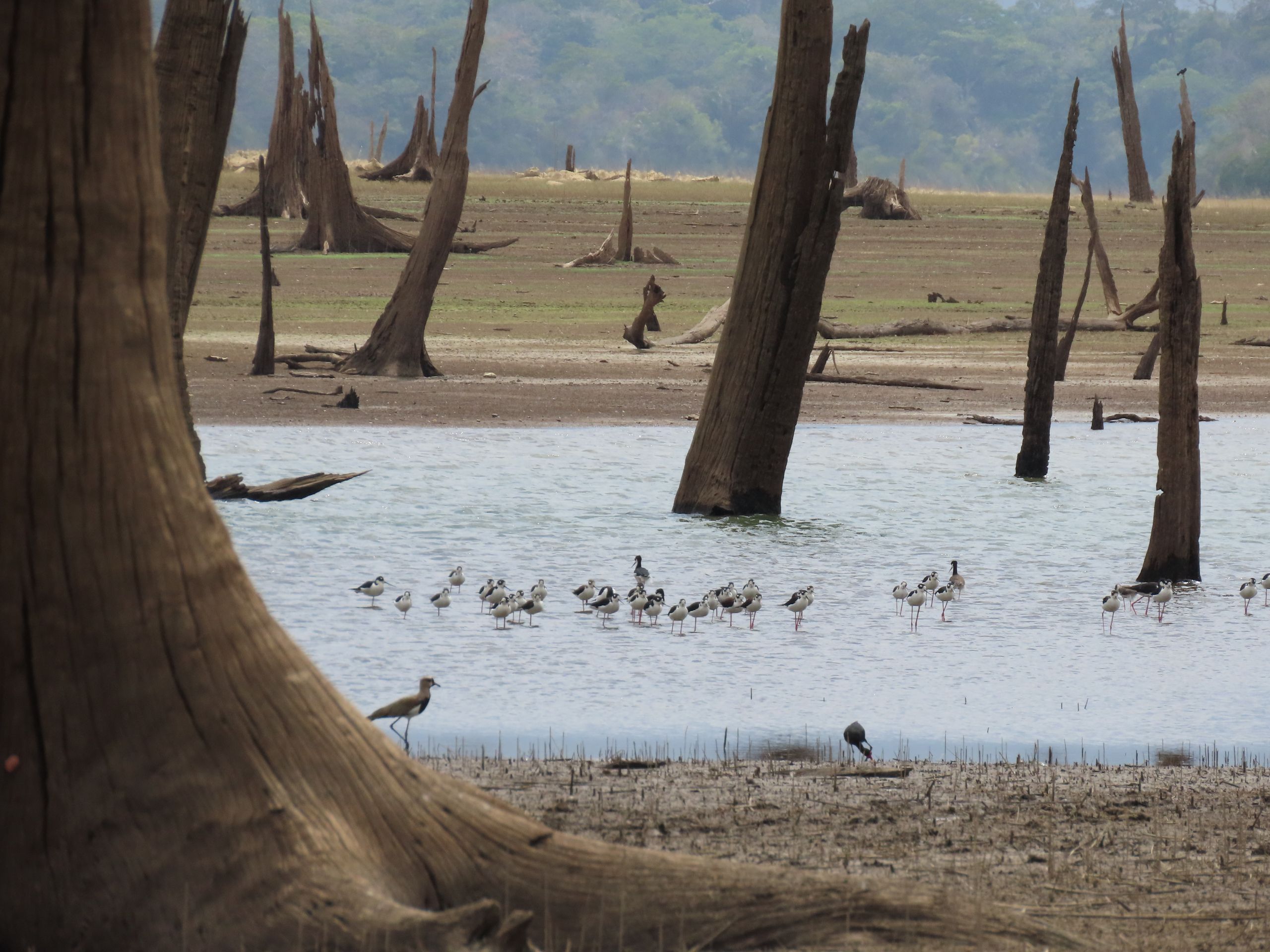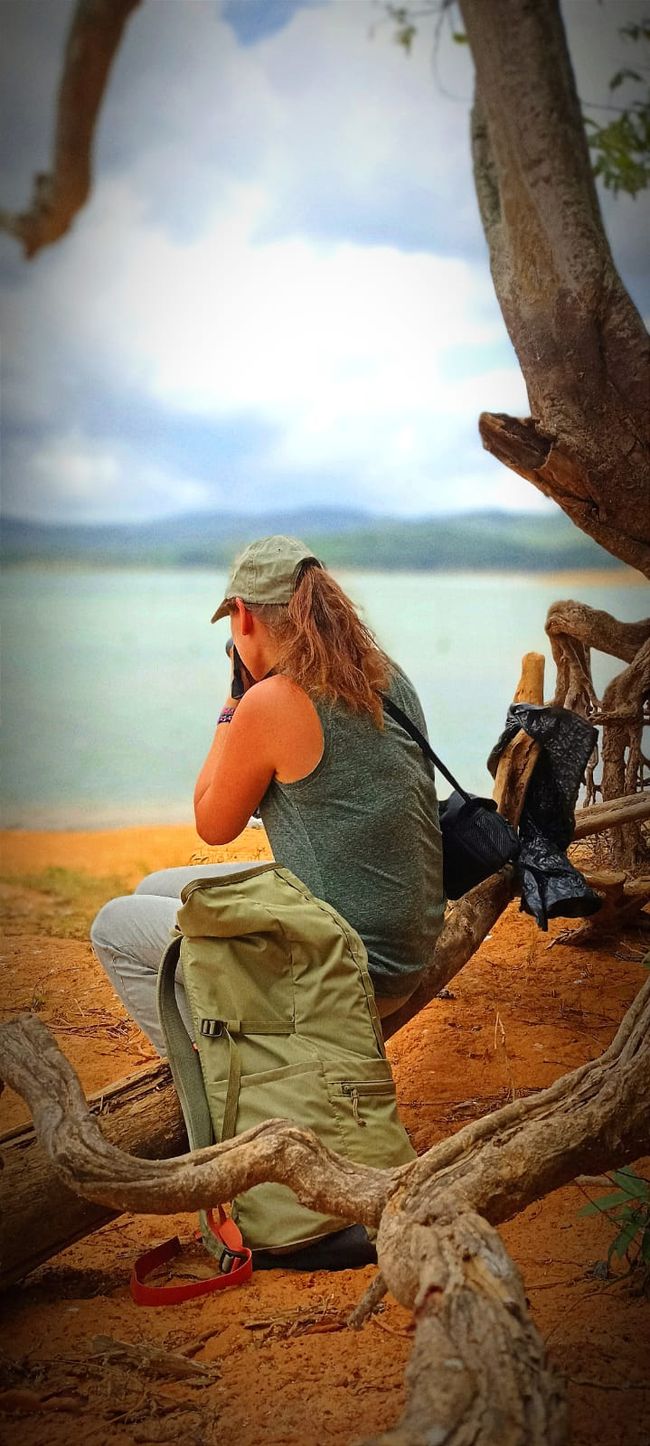From rich Chinese, confiscated birds and a trip to the big city
Ishicilelwe: 12.10.2018
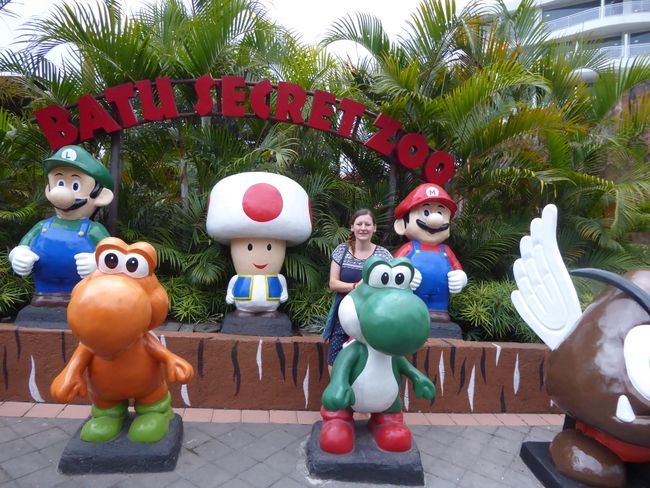
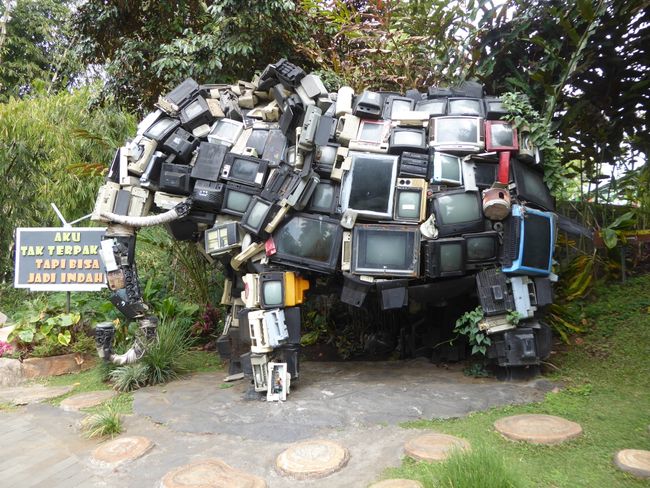
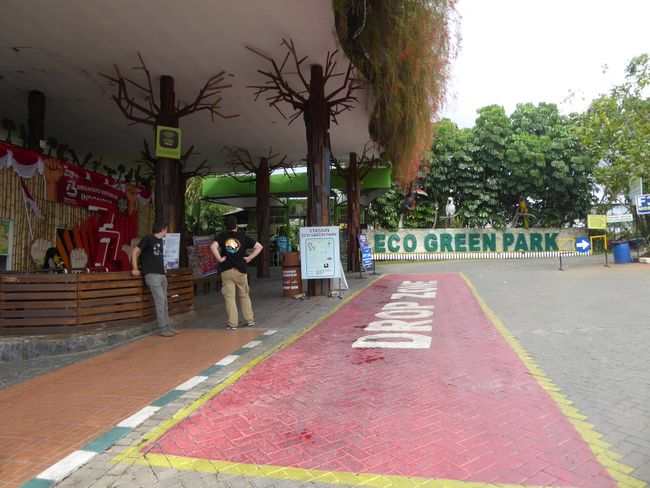
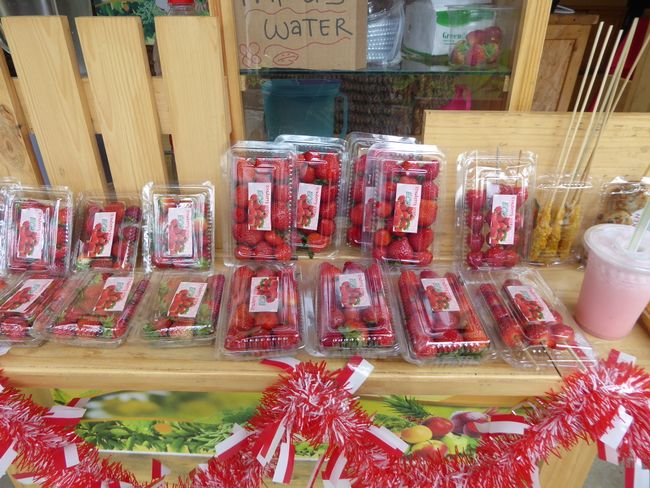
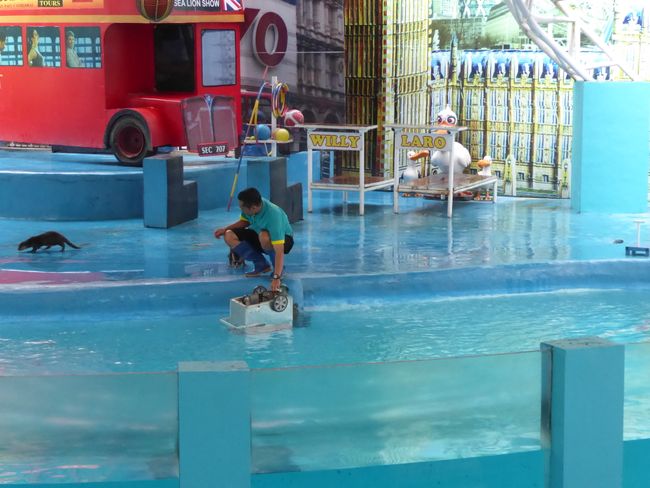
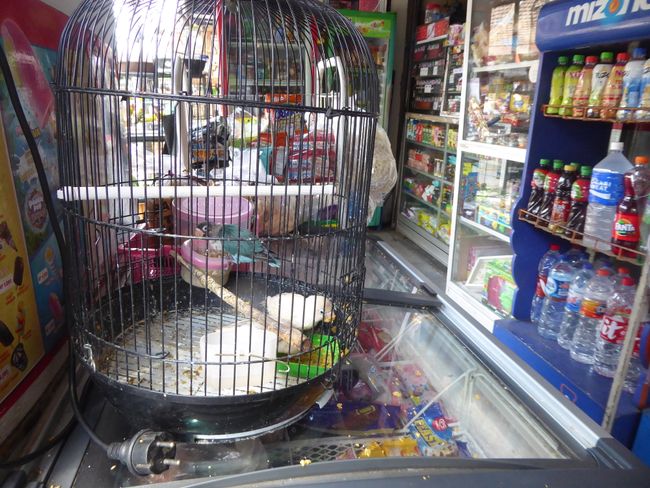
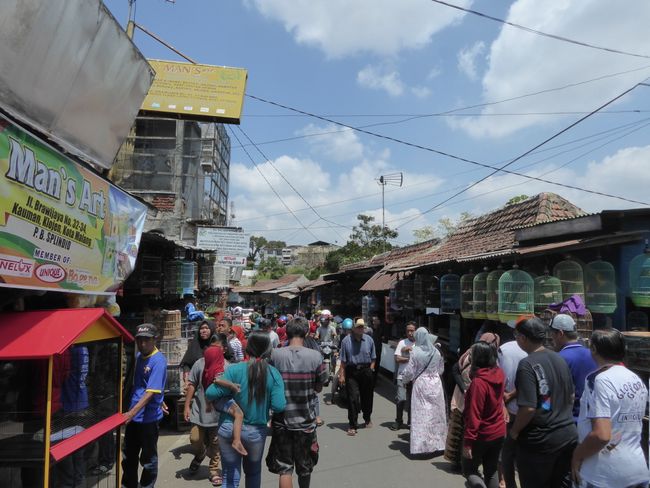
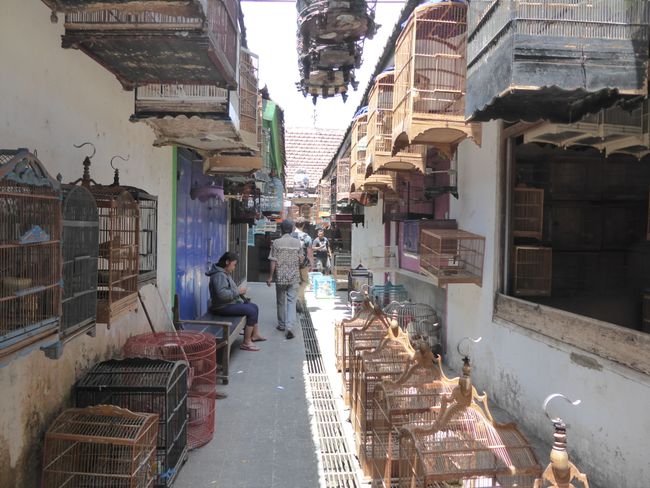
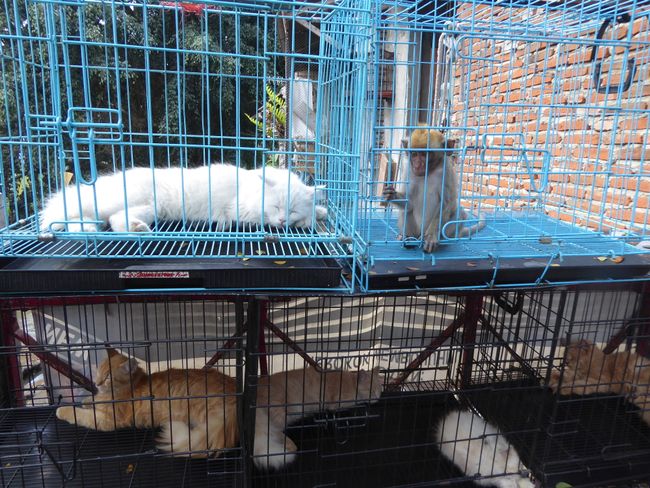
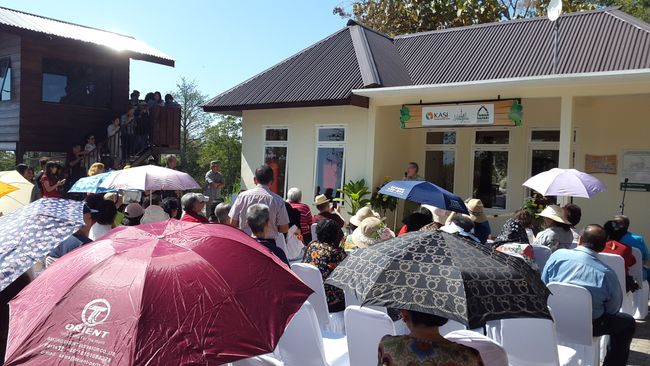
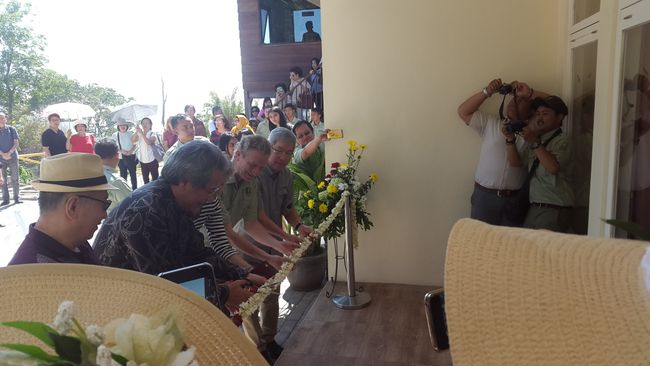
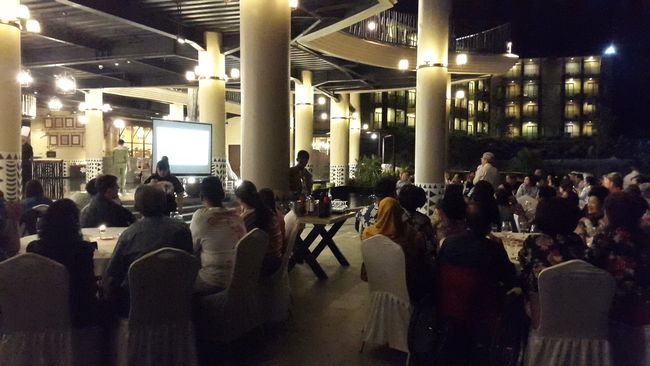
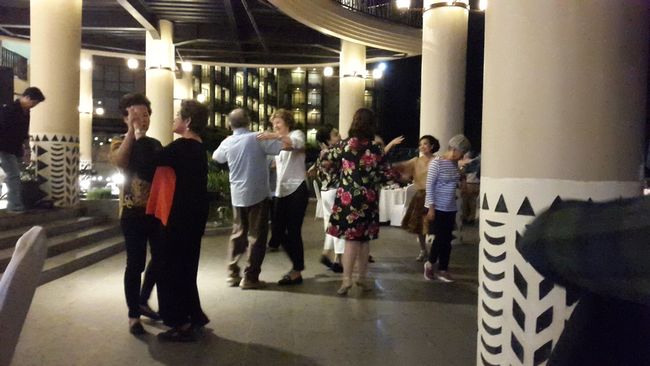
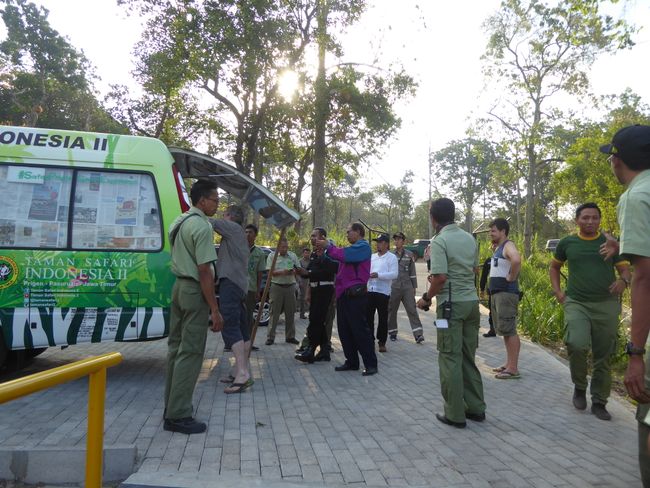
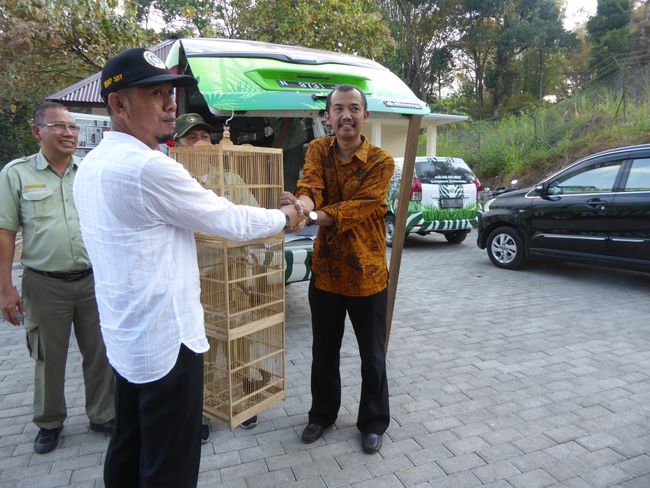
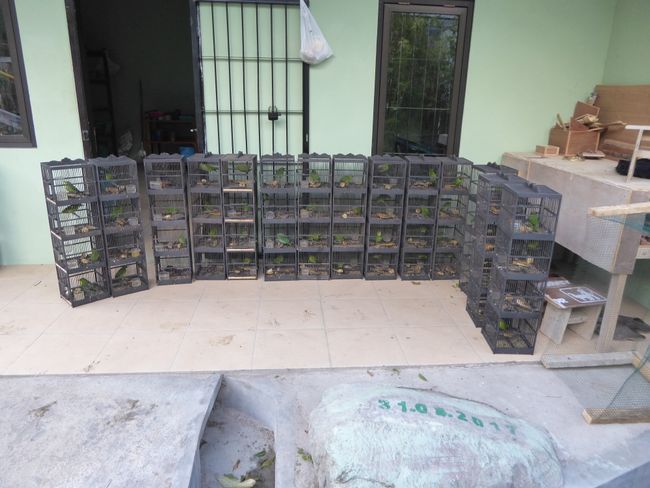
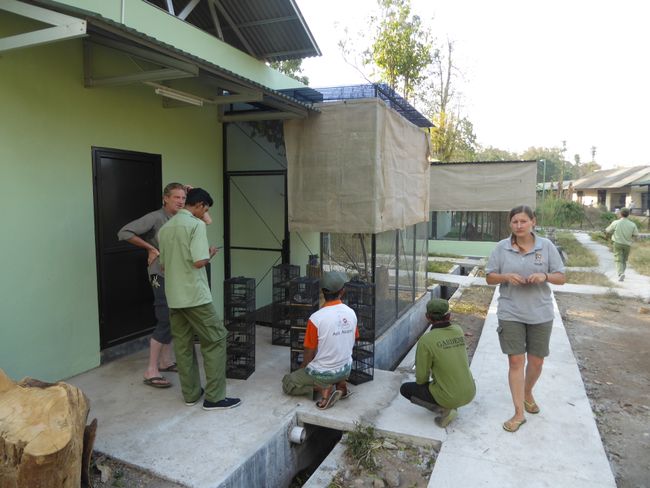
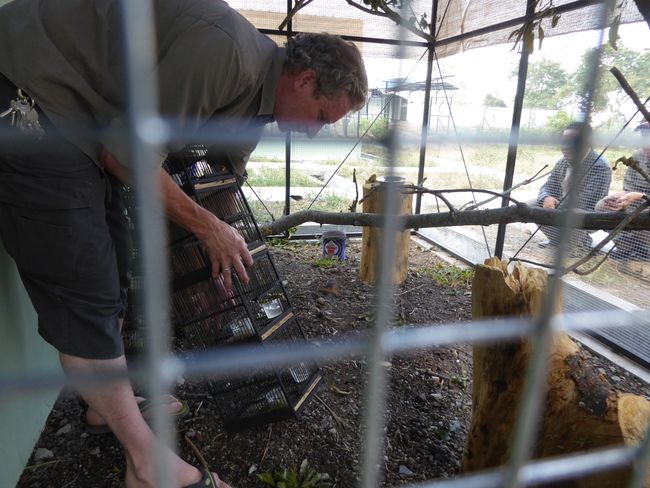
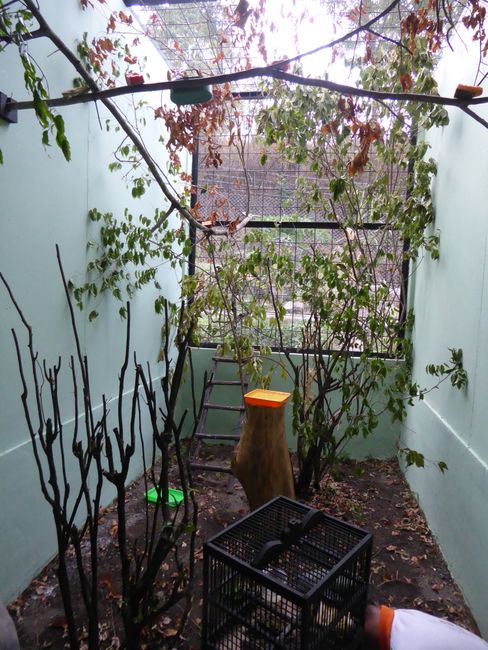
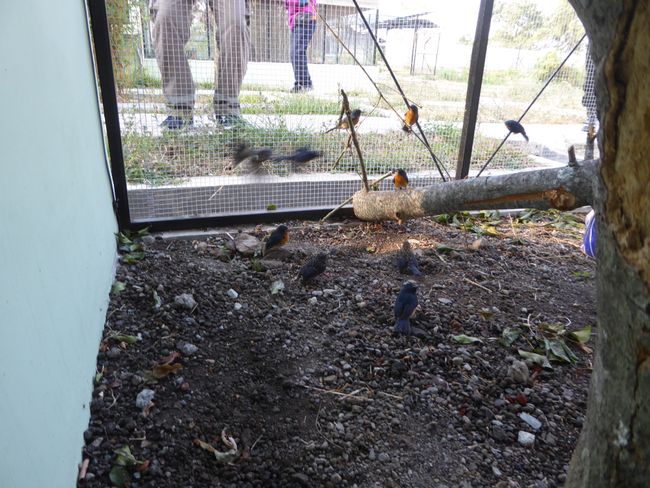
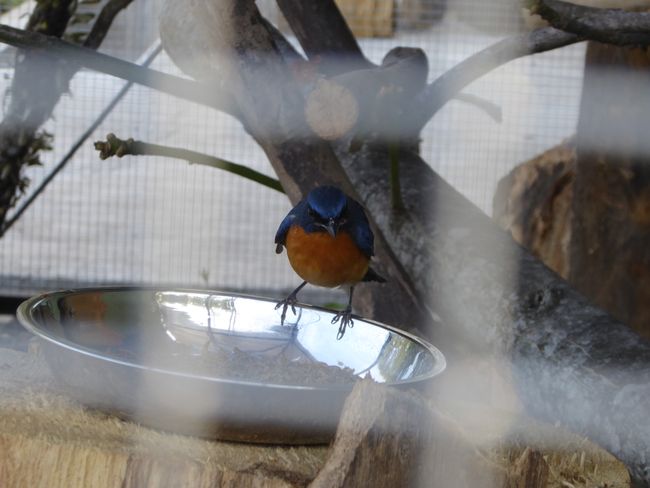
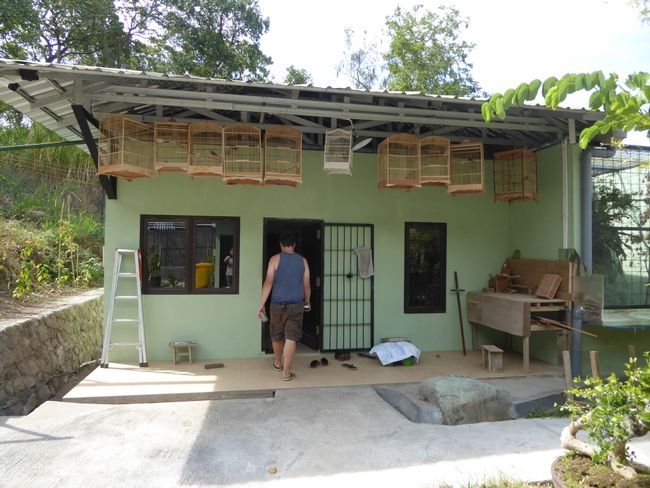
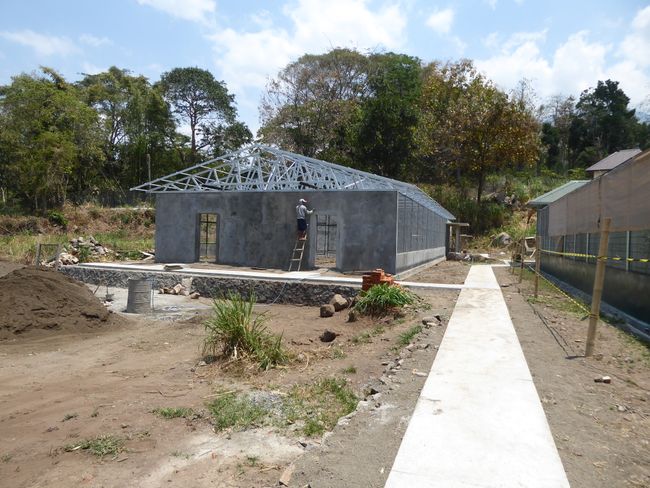
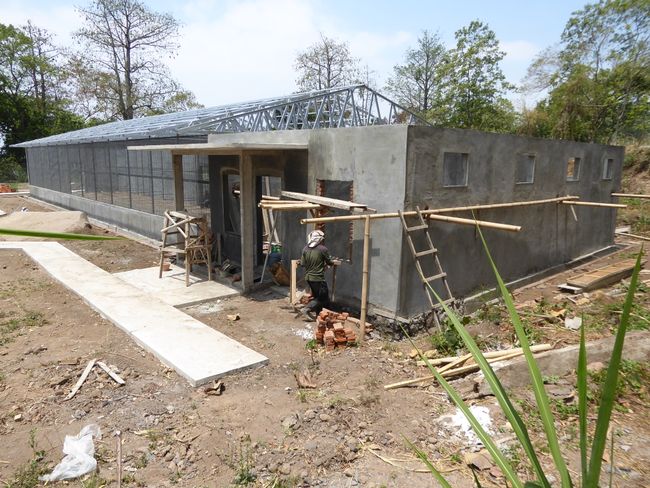
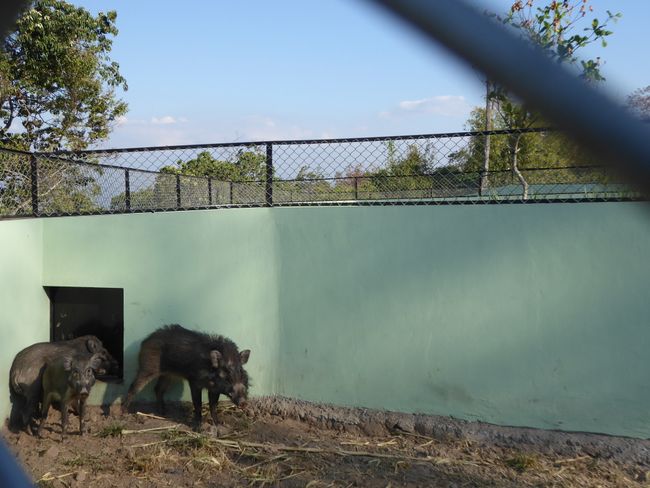
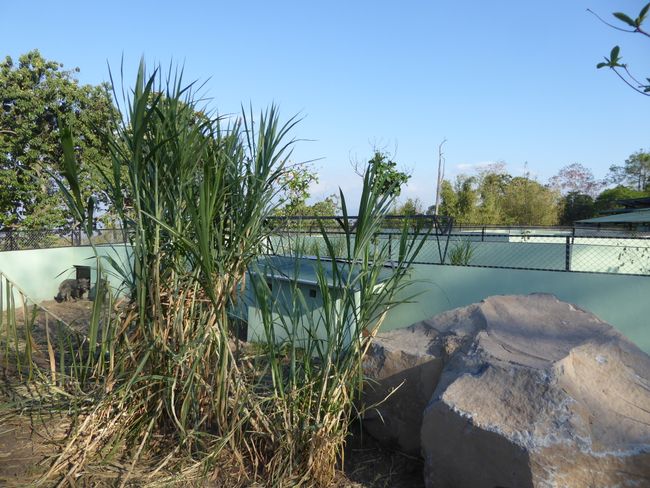
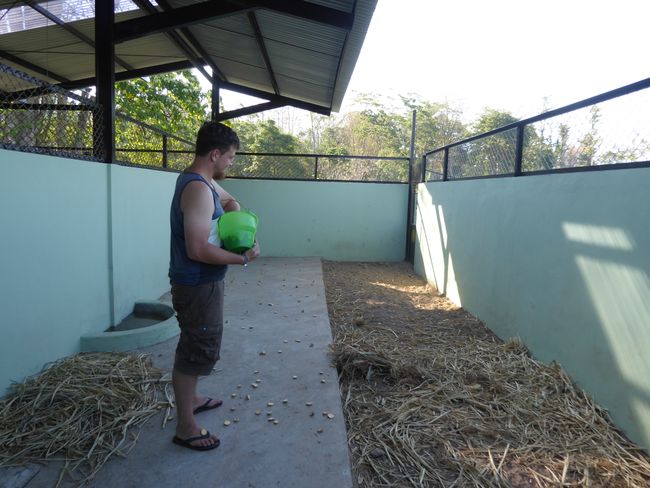
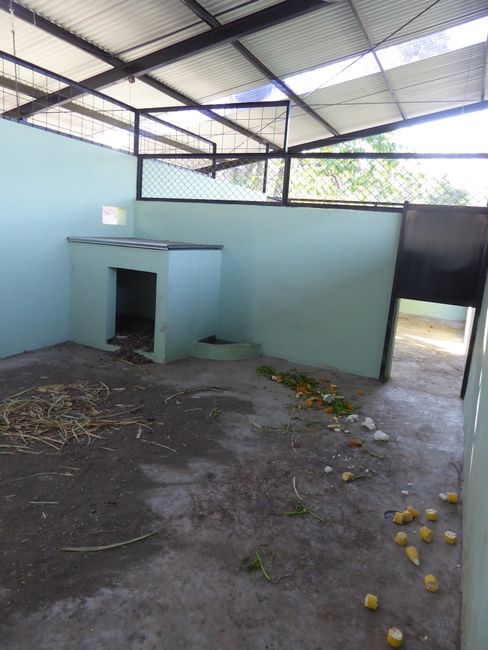
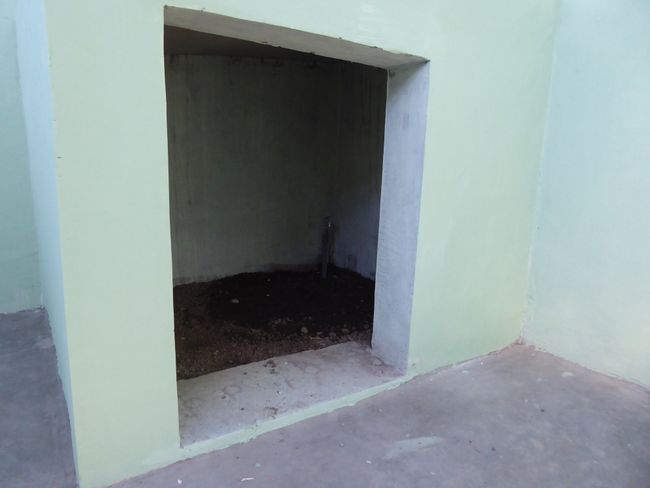
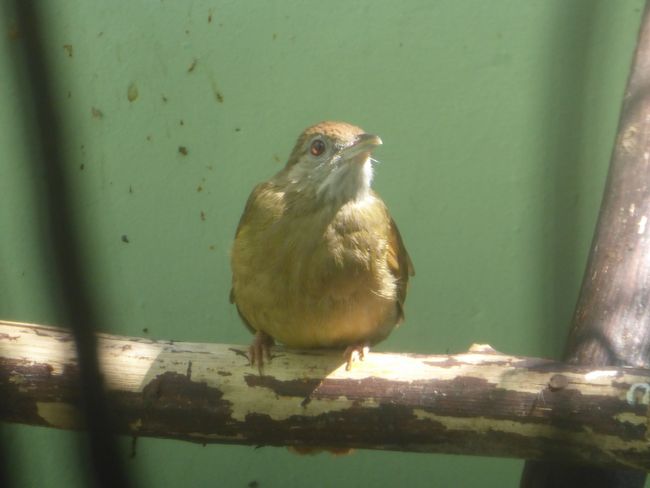
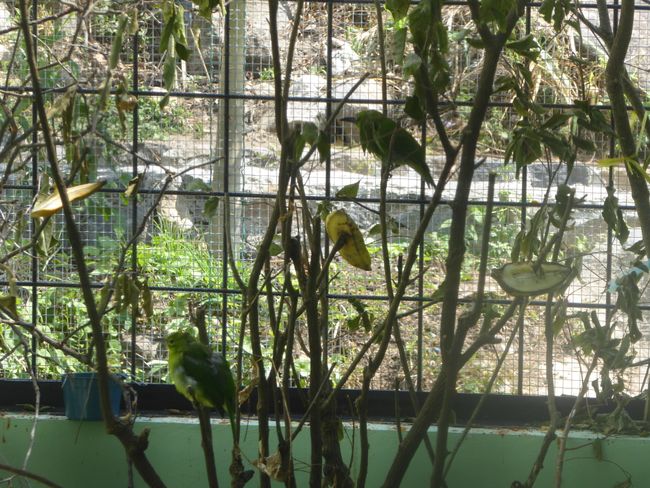
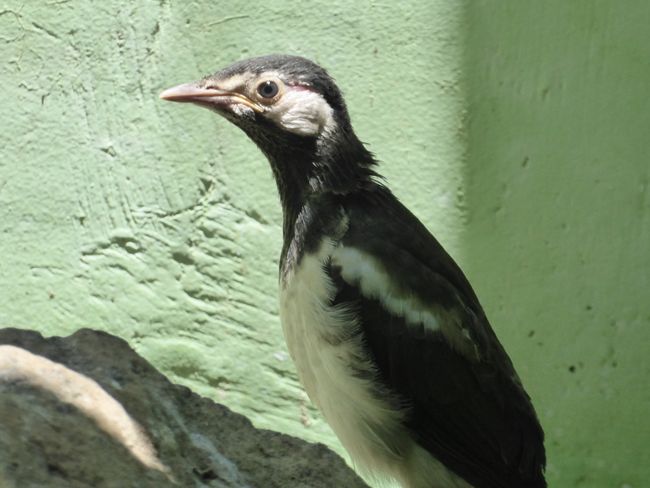
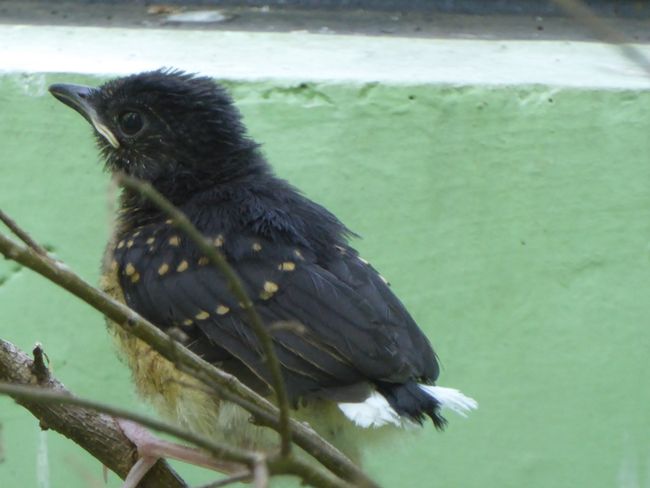
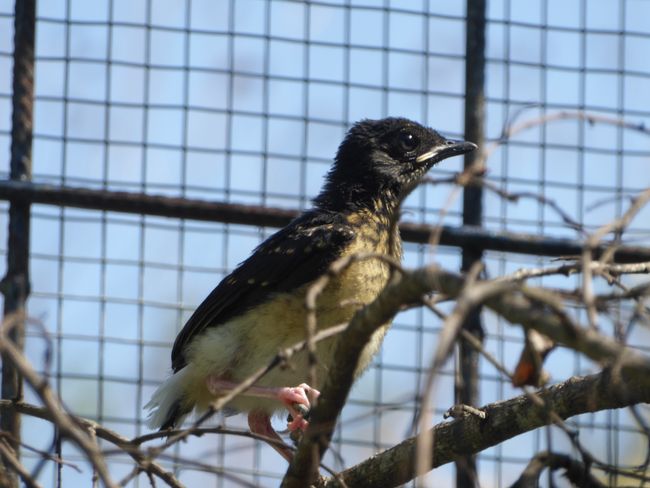
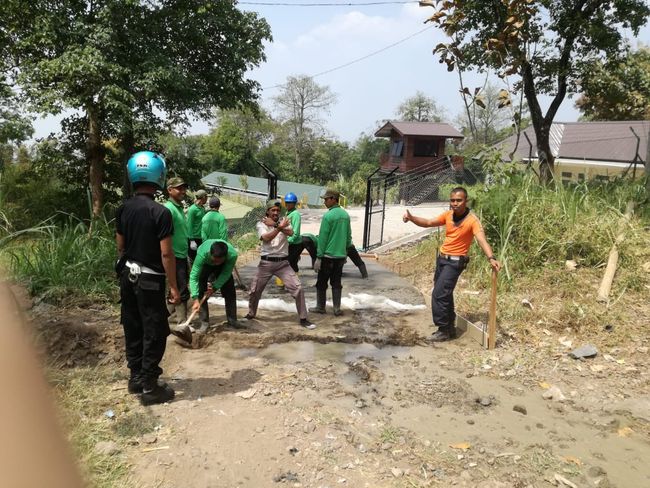
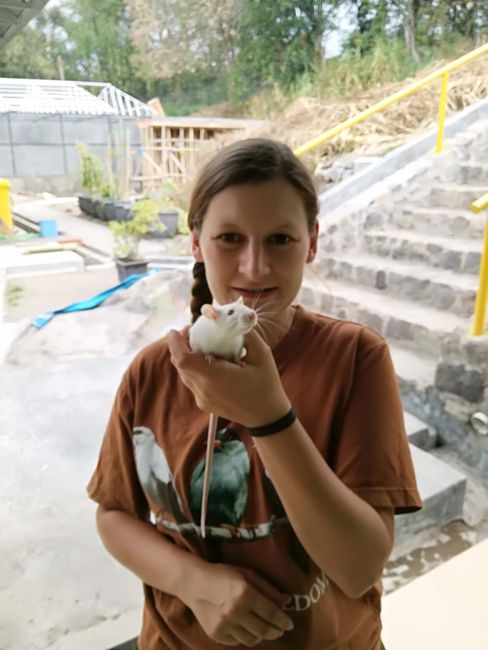
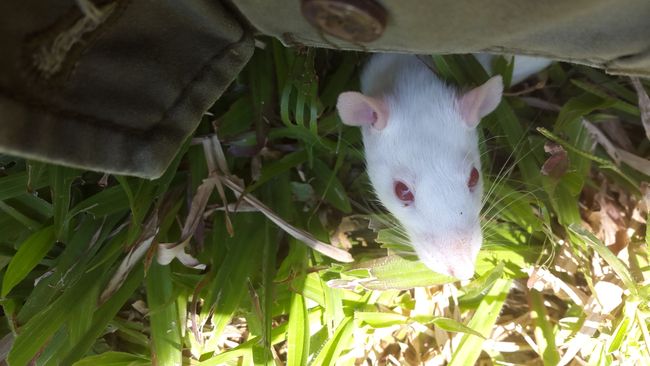
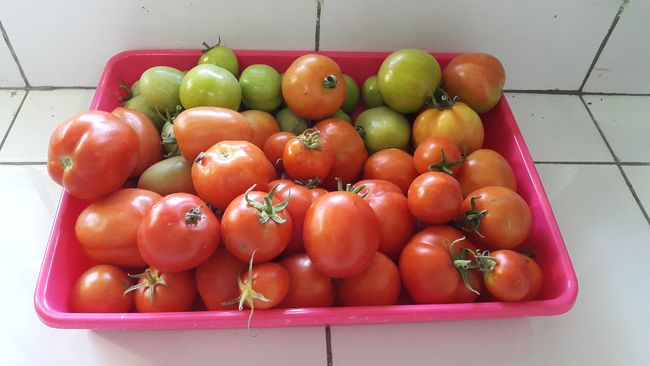
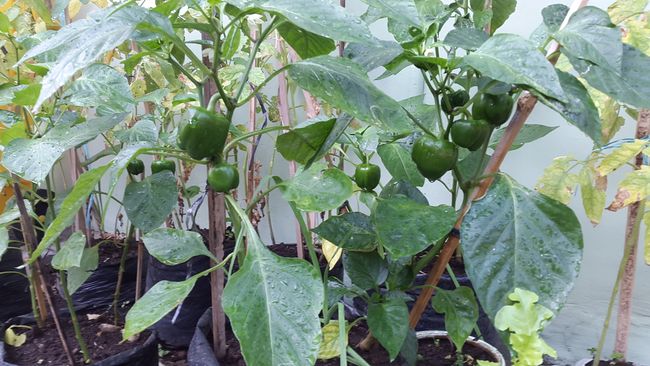
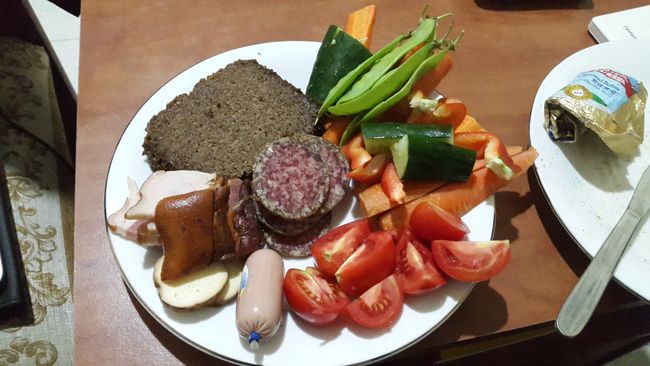
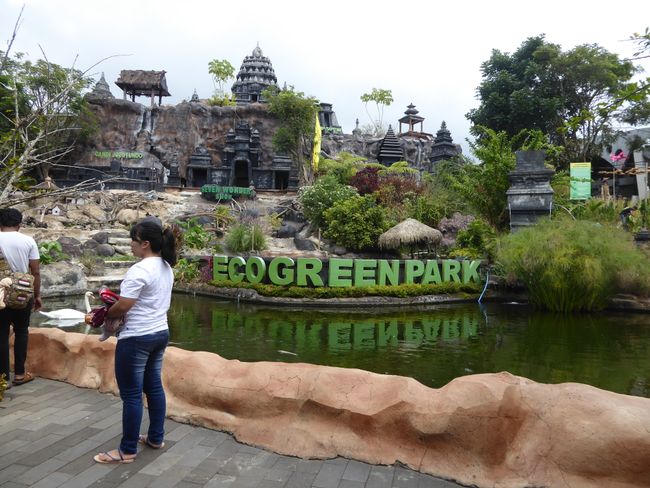
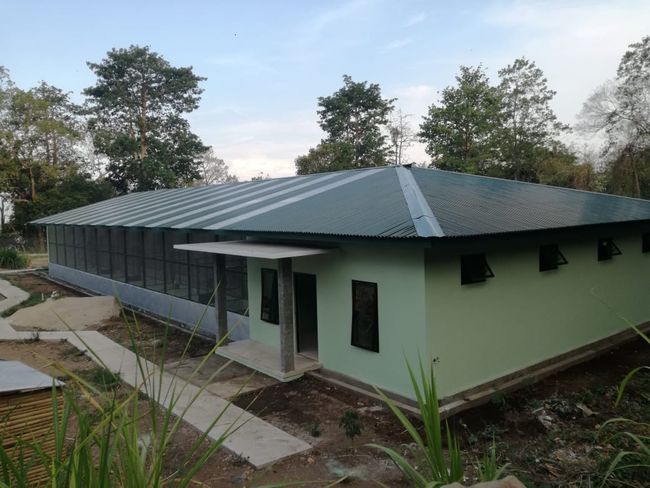

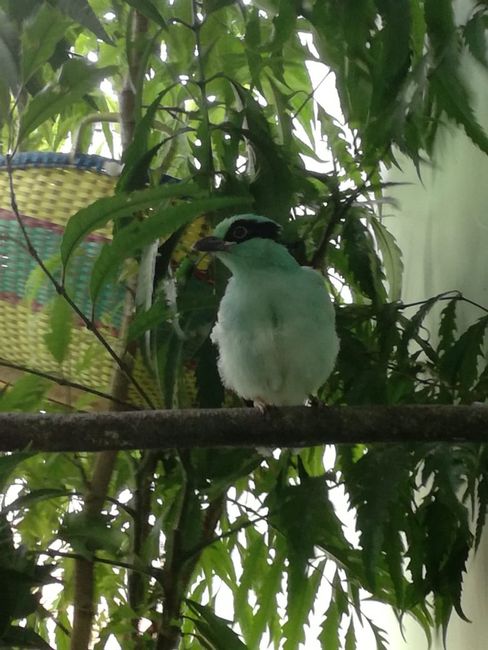
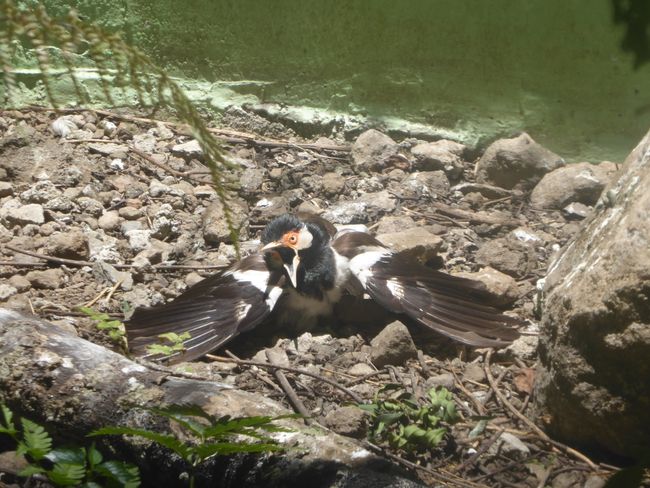
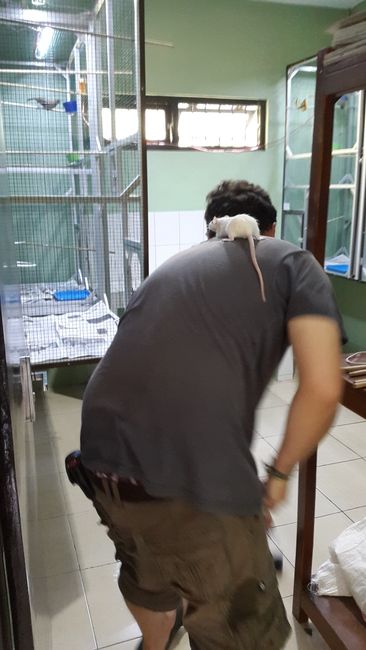
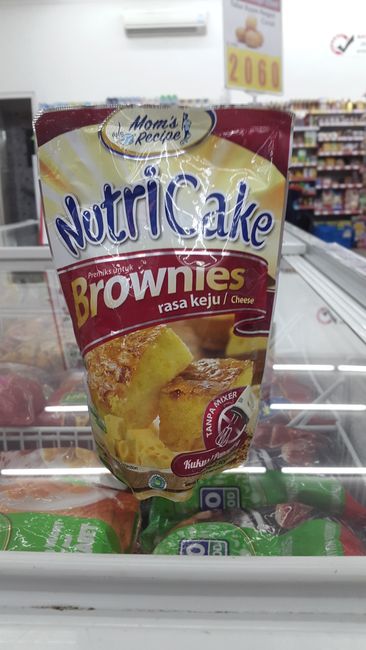
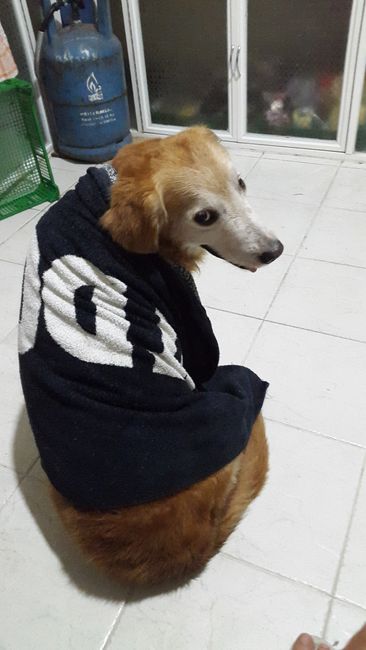
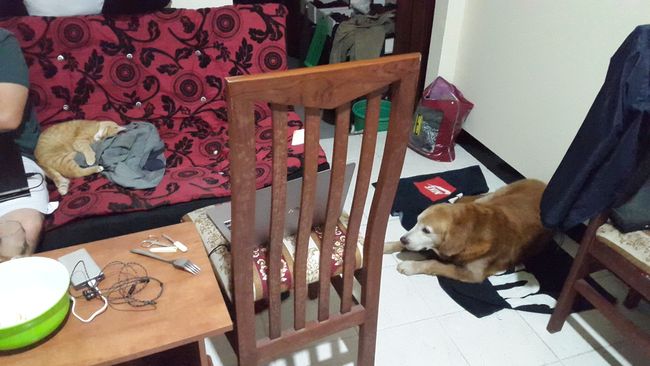
Bhalisela i-Newsletter
It never gets boring! Even after more than 10 months, we always have something going on. Whether at work or in our private lives, we always have something to do, face new challenges, and constantly gain new experiences. Right now, the days are flying by and we have to be careful not to let everything pass us by and realize in the end that we haven't enjoyed everything enough. The thought of being back in Germany, dealing with job searches, government offices, unnecessary bureaucracy, or a stressful work routine, or bundling up in 20 layers during winter, is rather strange for us at the moment. But there are also some things that we miss and so we are really looking forward to our visit to Germany in December! The flight is booked, most of the Christmas presents are bought, and a rough plan is made. We hope for snow, a beautiful Christmas atmosphere, delicious food, and to see many dear people again. But until then, we have our Indonesian everyday life, which is currently very diverse and exciting.
A while ago, we took 3 days off to take a trip to Malang and Batu. In Batu, we wanted to visit Jochen, a German colleague who has been working as a bird curator at the Eco Green Park in Batu for a few months, and in Malang, we wanted to go shopping and relax. Since we had decided against riding motorcycles there for various reasons, we took the bus to Malang. First, we took a motorcycle taxi down to the village, stood by the roadside and hoped that a bus would stop. After about 10 minutes of waiting, we were on a bus to Malang. It takes about an hour and a half to cover the less than 50 kilometers and costs just over 1 euro. In Malang, we met up with Jochen at a restaurant called 'Rumah Opa' ('Grandpa's House'). After pizza and beer, we went to Jochen's place in Batu.
The next day, we visited his workplace. The Eco Green Park is part of the Jawa Timur Park Group, which also includes the Batu Secret Zoo and other parks and museums. It is a pure bird park (except for the insectarium) with a focus on environmental education. For example, there is a lovingly designed corner in the park that provides information on garbage, recycling, composting, and waste reuse in a vivid way. But the diversity of species is also impressive: numerous parrot and songbird species, all flightless bird species (except for the kiwi), cranes, various waterfowl, hornbills, etc. Unfortunately, I hardly took any photos in the zoo, so anyone who wants to see pictures of the animals and enclosures will simply have to come by.



In the park, there are several of these 'trash animals' standing around. The elephant is made of old technical junk, and another animal is made of old car parts. Unfortunately, there was no VCR for me here ;)

In the Batu Secret Zoo right next door, there is also a good collection of species, just like in the Eco Green Park. However, it mainly houses mammals, but also reptiles, amphibians, and fish. I was quite surprised by the many non-Asian species that are rarely seen in this country. For example, lemurs, hyenas, anteaters, long-nosed echidnas, and a huge number of coypus. Unfortunately, I only took a few photos here...
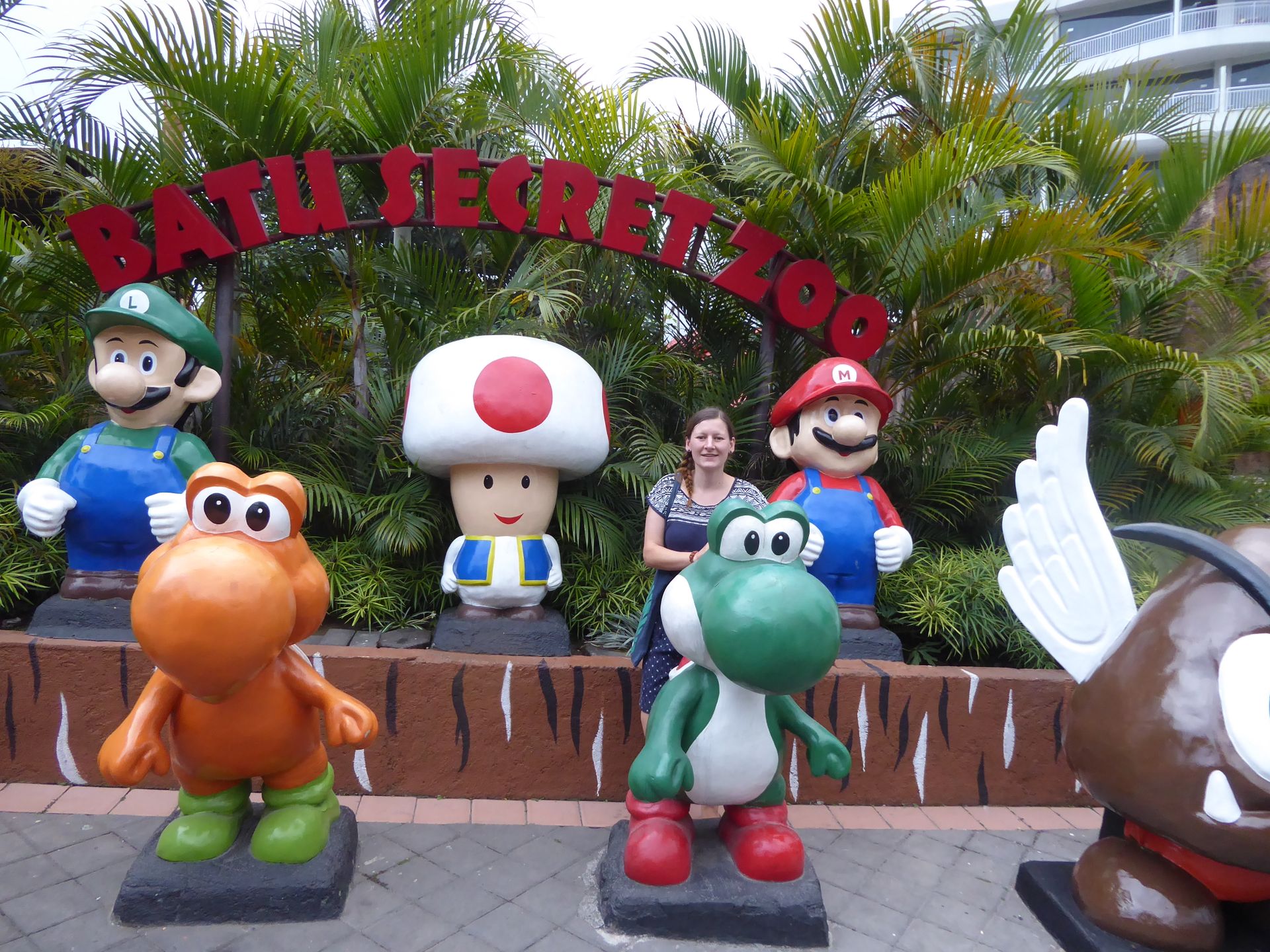

The sea lion show was like most Southeast Asian sea lion shows. Clapping sea lions, otters pushing carts, the typical ball and hoop routines, and shrill music. Otters are just not made for pushing carts, so the vehicle ended up in the water.
The next day, we headed back to Malang. Since it is not too far from Batu to Malang, we took the bus in the morning. The local transport buses are called Angkot here. These are small buses with a fixed route, but they pick up and drop off passengers anywhere along their route. You just have to tell the driver where you want to get off. The whole thing is super cheap (we never paid more than 8000 Rupiah, about 45 cents), but it takes a seemingly eternity due to the constant stops. It took us almost 1 hour to cover the approximately 18 kilometers from Batu to Malang! Fortunately, our hotel was on the bus route, so we got off right in front of it. The rest of the day was dedicated to a shopping marathon, as we had brought a long shopping list to Malang. Mostly things that are not available near us but were on our wish list for a long time. The most important item was the dehumidifier, which is supposed to help keep our apartment somewhat dry during the rainy season. Since Indonesians, for inexplicable reasons, sell humidifiers rather than dehumidifiers, we were super happy when we found a dehumidifier at ACE (a mix of Ikea and a hardware store, but much smaller). The second to last one, mind you! We also bought two sofa pillows (after being refused the purchase of various pillows because they were meant for sleeping and not for the sofa... that's Indonesia), 2 matching covers, and various odds and ends. We somehow carried everything to the hotel, partly on foot and partly in one of the tiny Angkots. In the evening, we had delicious burgers, where we coincidentally ran into the curator of the Batu Secret Zoo, Jochen, and a few other Europeans. It should be noted that although Malang is quite modern and touristy, there are not a lot of good non-Asian restaurants there.
On our last day in Malang, we went to the bird market in the morning, one of the largest bird markets in Indonesia. The trend on bird markets is currently shifting towards more and more rare species disappearing from there and being replaced by other species that are offered in large numbers. This sounds good at first, but it means that these species are either hardly or no longer present in nature or are being bred very little or not at all. One of the reasons for this may be a long overdue and welcome step by the Indonesian government: They have expanded their list of protected species from 677 to 919, including 562 bird species alone, after almost 20 years. Those who trade, keep, or kill any of these species can face prison sentences of up to 5 years or fines of up to 7000 euros. Only certain breeding facilities are granted exceptions. Suddenly, thousands of bird keepings in Indonesia are now illegal. If you include all the private households with caged birds in addition to the markets, shops, and breeders, there may even be millions of them. The government's plan now is to confiscate all illegally kept birds and release the majority of them back into the wild. Sounds good at first, but it is hardly, if at all, feasible, and most of the birds would not survive a minute in the wild as they have been in captivity for too long. Due to pressure from the bird lobby and protests from bird keepers, the government has already backed down and removed 5 species from the list again.
But back to the market. The scene there is shocking and sad, as it is on any bird market:
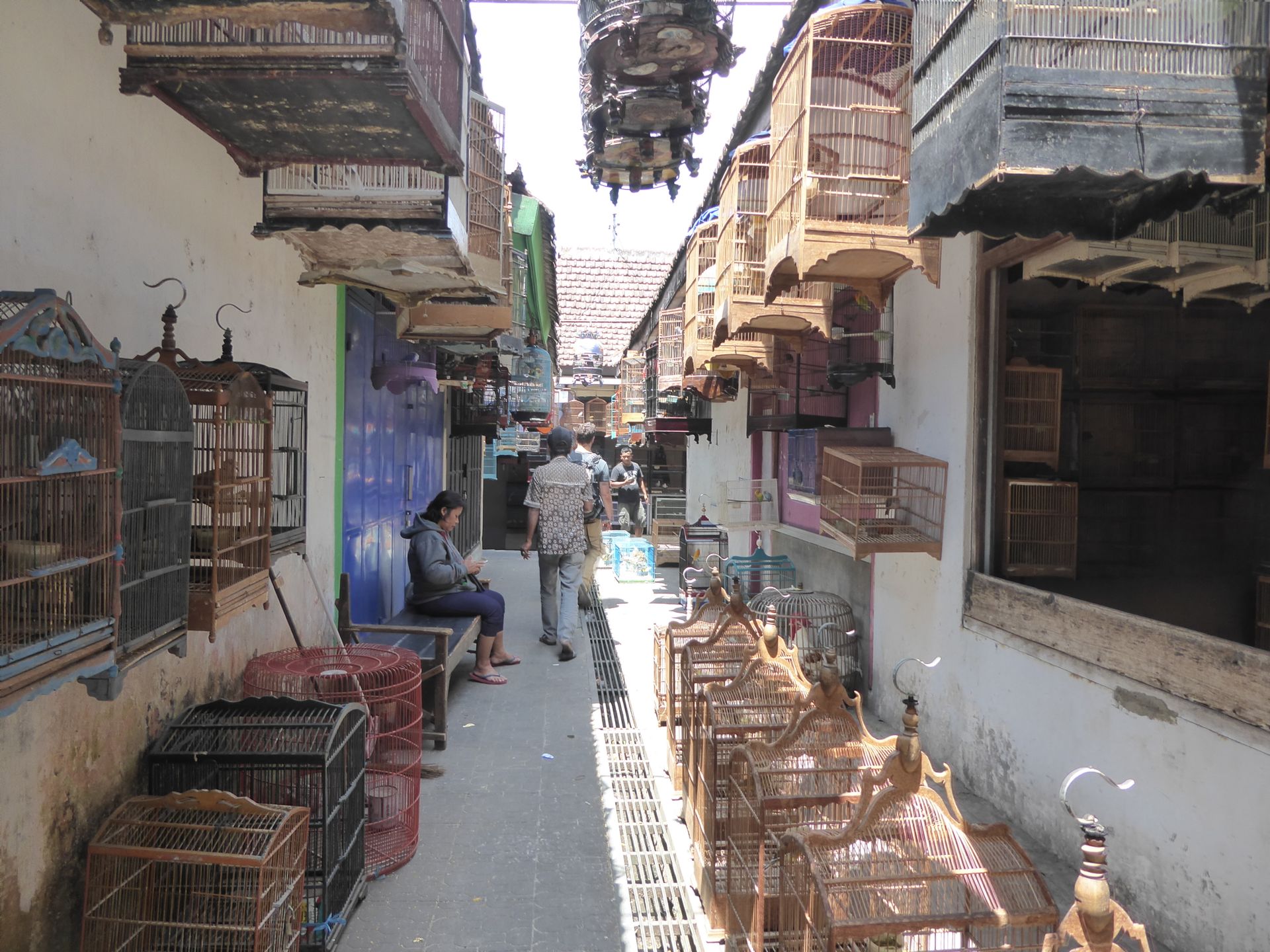
Hundreds of birds in sometimes dirty cages and in the scorching sun.
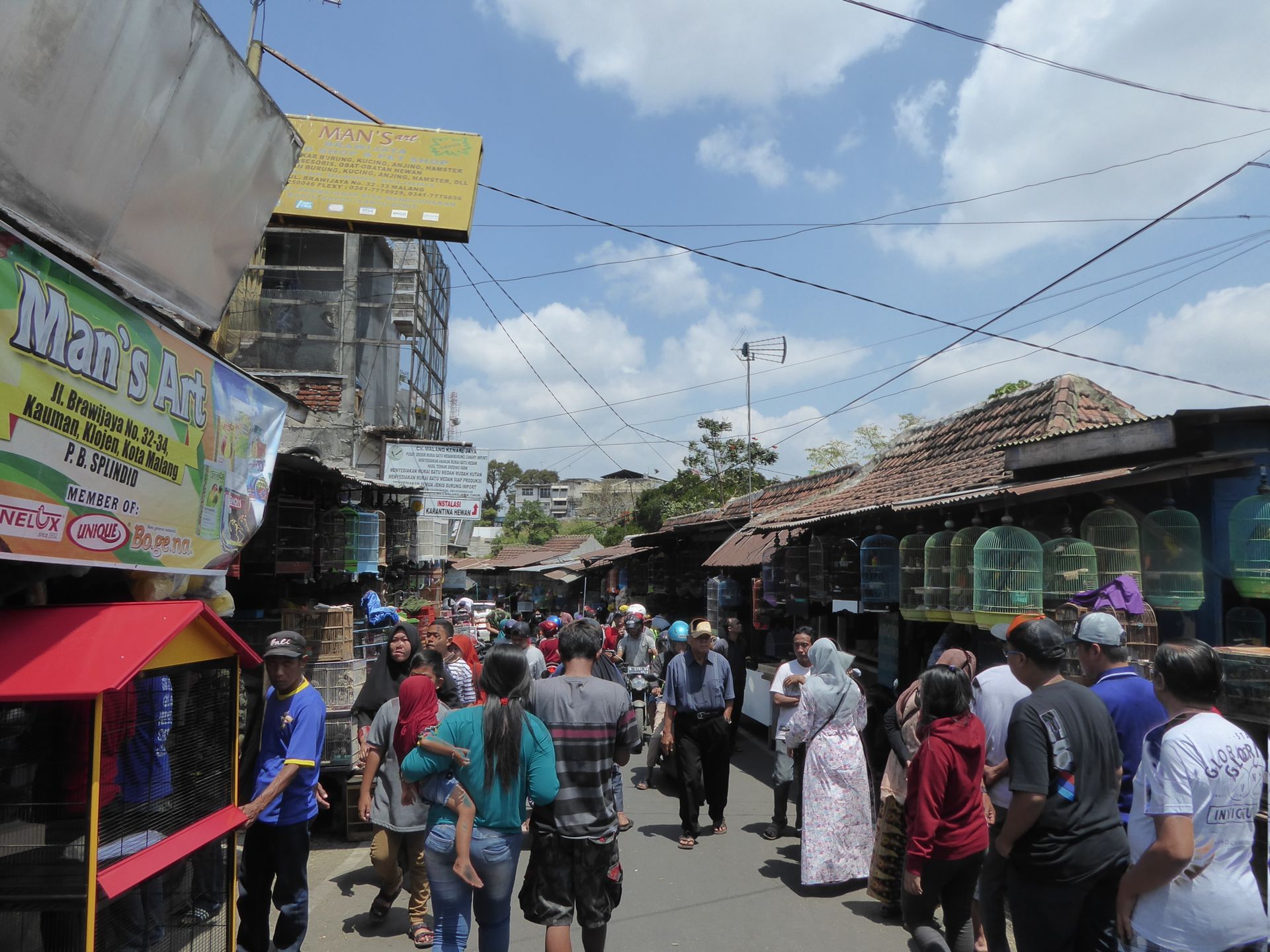
The demand is huge. Whole families make a trip to the bird market. It can only be speculated how many animals are sold on such a day and how many will not survive the day.

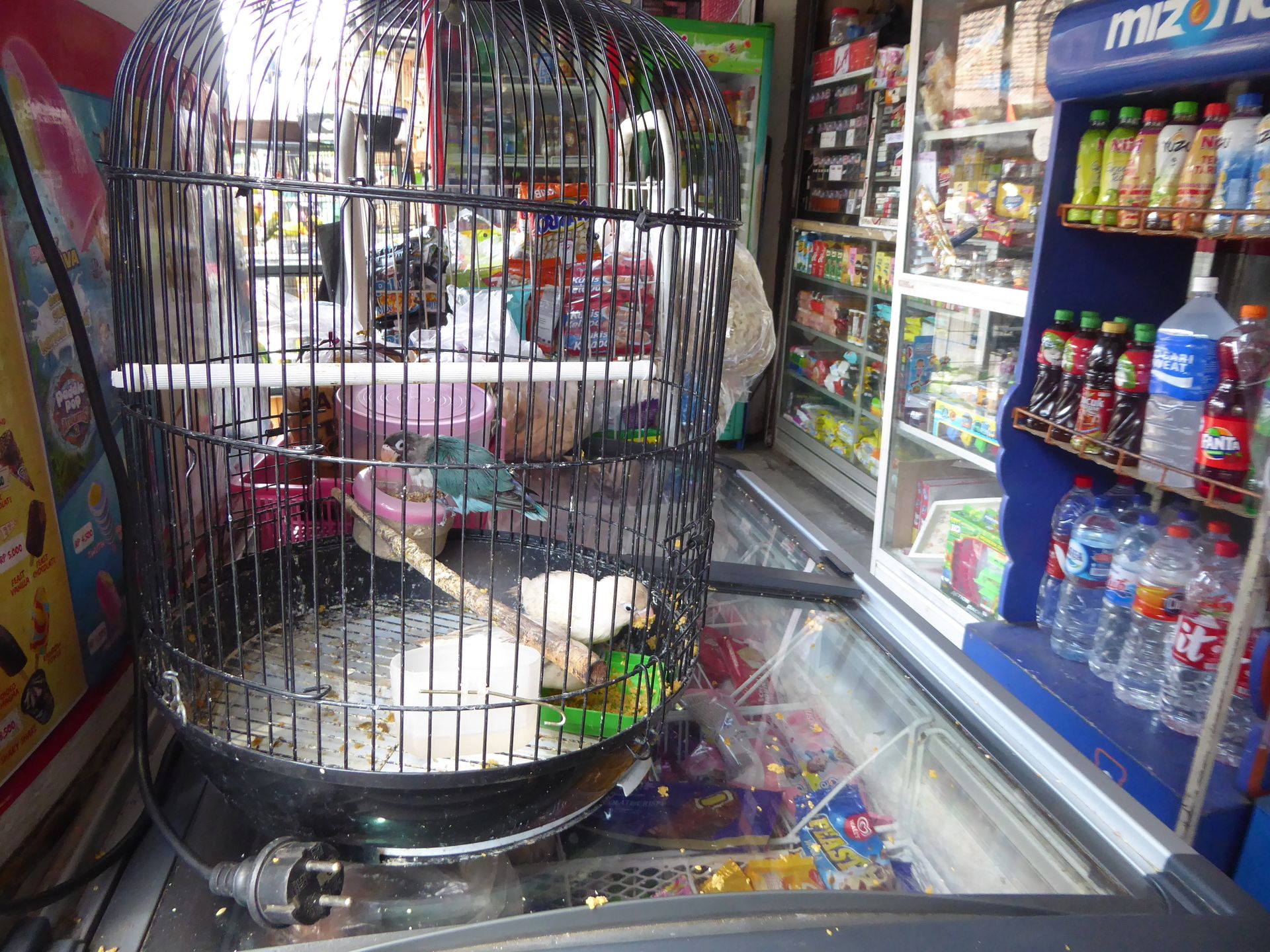
After the bird market, we still had some time to buy a few things. However, shortly before, Roy's credit card had been swallowed by an ATM, and since I had paid for the dehumidifier with my credit card the day before, my bank had the smart idea to block my credit card (even though I had already informed them a thousand times that I'm in Indonesia). That meant we had to budget our last money well so that we could at least still pay for the bus ride home. In the rather Western supermarket where we wanted to buy some groceries, we had to calculate the price of each item to not exceed a certain sum. It was really tough because they had great things like yogurt, cheese, butter, Roy's beer, and bell peppers. In the end, it was good that way because we didn't buy too much. At the checkout, I tried my credit card again and for inexplicable reasons, I was able to pay with it. However, in the next few days, the card was definitely blocked. From the hotel, we then took a taxi (we were loaded like donkeys and wouldn't have fit into an Angkot) and had them drop us off at the outskirts of the city. There were supposed to be several rattan shops there because we still needed a shelf. After finding what we were looking for, we tried to catch a bus home from there. But it was rush hour, and the buses that inched past us at 0.1 km/h were already full. Eventually, we got lucky and got on a bus, thanks in part to the rattan shop owner. This time, the journey from Malang to Palang (the intersection to Taman Safari) took at least 2 hours. In the end, everyone on the bus greeted us cheerfully, waved, and rejoiced (apparently, not many foreigners ride this bus). Unfortunately, Roy spilled a beer in his backpack while squeezing out of the overcrowded bus, and it went everywhere. Poor Roy.
After our little trip, we realized that Malang is a completely different world from our small village on the mountain near Taman Safari. In Malang, you can find almost everything you need. There is almost every kind of food available (even alcohol), modern restaurants, shopping centers, markets, a well-developed public transport, and much more (not so unusual for a city with nearly 1 million inhabitants). But we also realized that we are quite happy not to live in the city. We don't need bars, cafes, shopping centers, etc. all the time. Instead, we have enjoyed the good things there much more because we don't have them every day.
And as I said, it never gets boring with us!
A few weeks ago, the Shanghai Group announced their visit to the PCBA. The Shanghai Group is an association of wealthy Indonesian-Chinese expatriates who are involved in various projects here. One of the members is Toni, one of the 3 top executives of Taman Safari. Since he is also working on finding sponsors for our project, he got the Shanghai Group on board right from the start. Since then, the Shanghai Group has been one of the main sponsors of our ark. The office building was fully financed by them, and that's why Toni invited all the members of the group to Taman Safari to officially open the building. However, I did not expect it to be such a formal occasion...
In the morning, about 80 people were brought by buses to our place. We shook dozens of hands, made small talk, and even received compliments for our good work. Most of the ladies and gentlemen were quite old, so chairs were provided for everyone. However, it was so hot on that day that most of them (those who could stand for more than 10 minutes) preferred to hide in the shade. Stephan gave a short thank you speech, we were officially introduced, and then a ribbon-cutting ceremony took place.
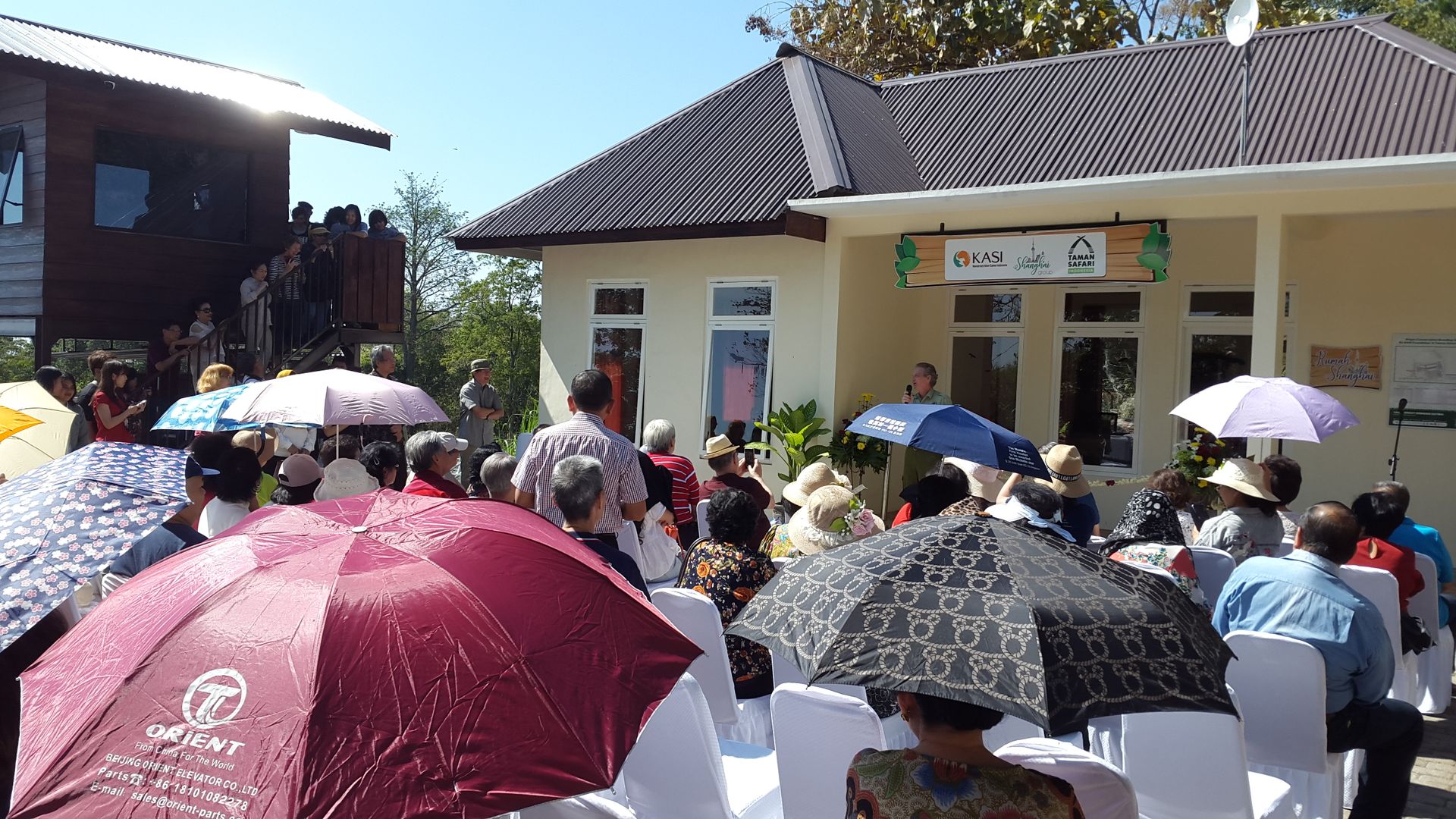
The entrance area of the building had a sponsor sign made specifically for it (with Stephan).

After the ceremony, our guests were able to explore the entire park and the breeding facilities. Some of them were actually quite interested. It should be noted that most of them are just sponsors and not actively involved in nature conservation.
In the evening, everyone gathered at the Baobab Hotel to have dinner together, and we were kindly invited as well. We were lucky with our table neighbors, all of whom spoke good English. Because our Indonesian language skills are at best enough for simple small talk. The food was great, there were different wines (which is very rare here), a type of roulade (no comparison to grandma's, it tastes much better!), salad, and Asian dishes. A documentary was shown on a screen about Toni that was made years ago. It was about the beginnings of the family as circus operators, their lives as showmen, the then modern training of tigers, lions, and other animals, and also about Toni as a person who is absolutely talented as an animal trainer and is born to work with animals in the circus.

The 'exclusive society'
After dinner, group photos of the Shanghai Group members were taken, and some people took to the dance floor. It was very interesting and amusing for us to watch, especially because some of the ladies were excessively made up. However, most of them looked quite wealthy. One of our table neighbors asked me if the dance the ladies were performing was a special dance. She told me something about a Lions Club, and I thought it was a small group of women who meet occasionally and do women's stuff. Roy later explained to me that the Lions Club is an international elite association of wealthy people, and one can only join by explicit invitation from the club. But anyway, these people were stinking rich and still quite nice.

We didn't dare to dance. But it wasn't really our kind of music either.
A few weeks before the visit of the Shanghai Group, we unexpectedly received guests of a completely different kind. Unfortunately and fortunately, you could say. Because the BKSDA announced its arrival with confiscated birds. The BKSDA is the Agency for the Preservation of Natural Resources and is under the Indonesian Ministry of Forestry. The BKSDA had received birds that had been confiscated by customs, which were presumably being smuggled from Borneo to Java. Now that the Indonesian government has expanded the list of protected species, almost every bird species that is of interest to bird keepers is now protected by Indonesian law. As these birds need to be properly housed and cared for, institutions like Taman Safari or the Eco Green Park in Batu agree, if possible, to take in these birds. The authorities themselves do not have the capacity or the personnel for their accommodation. However, the consequences of expanding the list should have been anticipated, and the necessary resources could have been put in place in advance. And so, Taman Safari received over 150 confiscated birds, formally handed over by the BKSDA. Some of the birds were able to be accommodated in the animal clinic, but their capacity is limited, so we took in a total of 84 confiscated birds.

I don't know why so many people were present when the birds arrived. A few people from Taman Safari, a few from the BKSDA, and us, of course. No idea who all the others were.
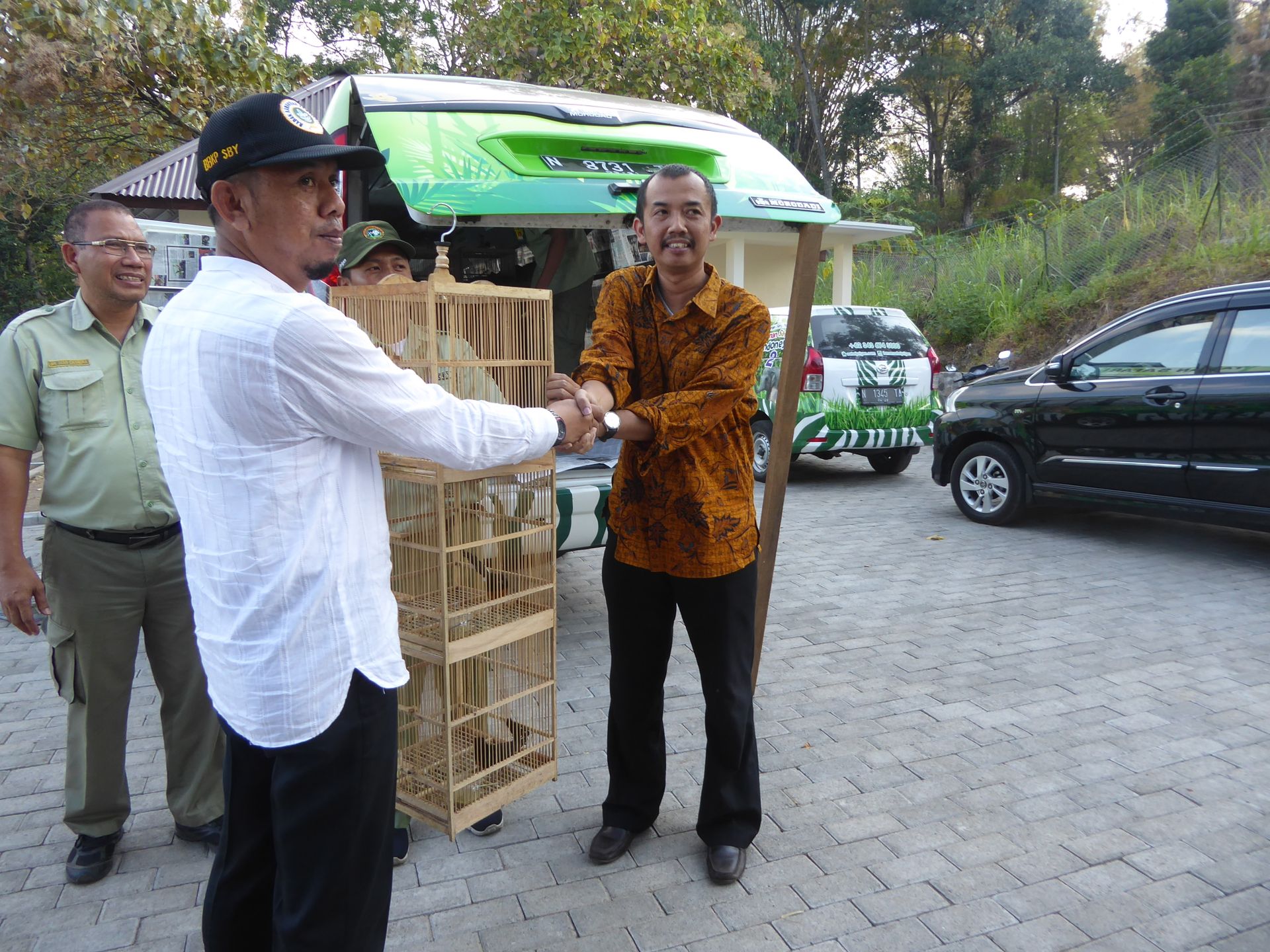


 Food and water were ready, and Stephan released them one by one into their new home.
Food and water were ready, and Stephan released them one by one into their new home.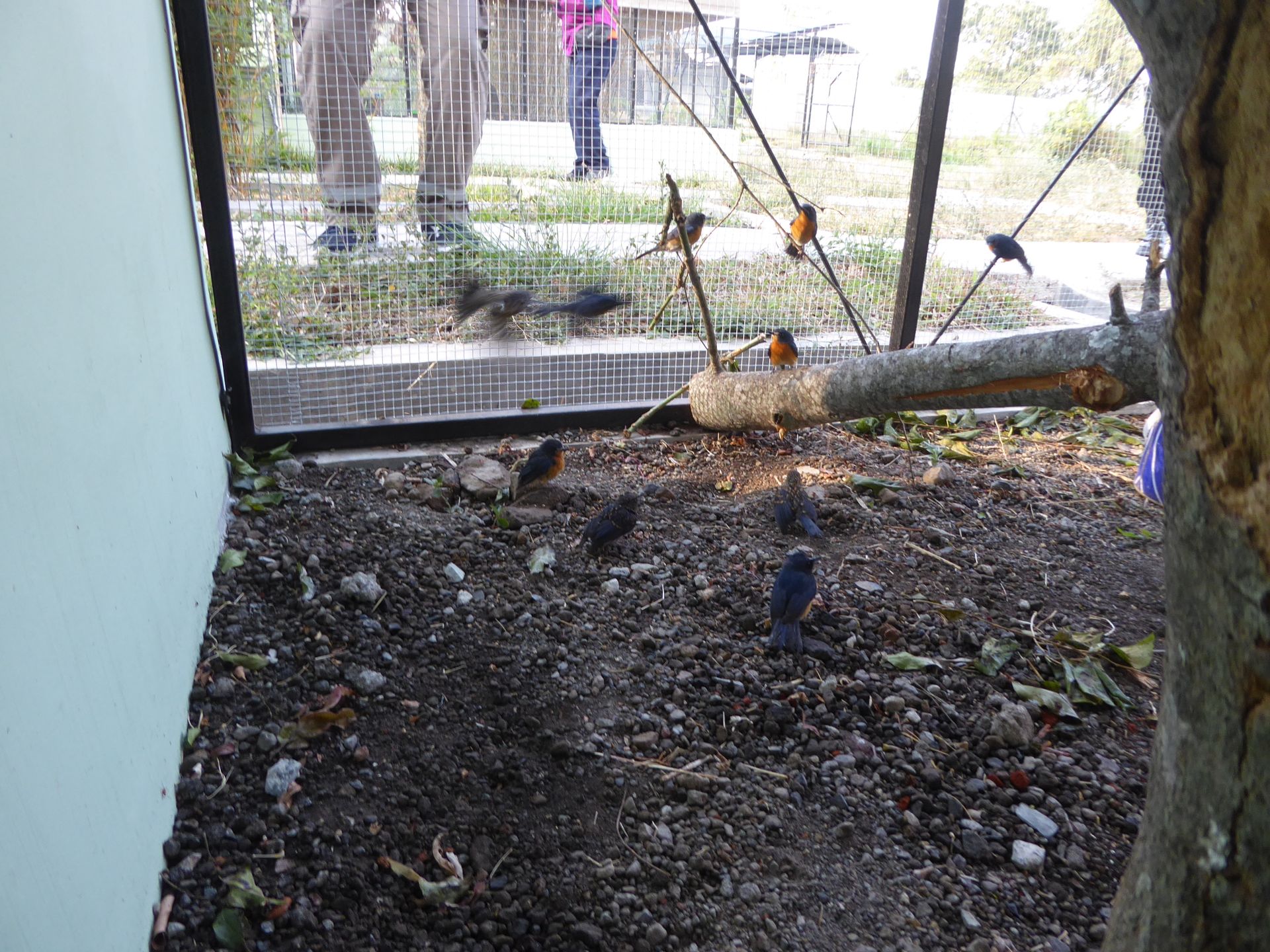 After the presumably torturous journey, the birds were naturally exhausted.
After the presumably torturous journey, the birds were naturally exhausted. The beautiful birds feed on insects (they are also called flycatchers), so they were given small worms and crickets for an 'all you can eat' feast.
The beautiful birds feed on insects (they are also called flycatchers), so they were given small worms and crickets for an 'all you can eat' feast. We redesigned several of our enclosures for the leafbirds. With lots of leaves for hiding, water and food everywhere, and a ladder for those who cannot fly well. There are already birds in the enclosures in this picture. It is amazing how well the animals are camouflaged in the leaves...they are leafbirds, after all.
We redesigned several of our enclosures for the leafbirds. With lots of leaves for hiding, water and food everywhere, and a ladder for those who cannot fly well. There are already birds in the enclosures in this picture. It is amazing how well the animals are camouflaged in the leaves...they are leafbirds, after all. The grey-rumped treeswifts are not compatible with each other, and since all enclosures were occupied, the 15 birds temporarily moved into portable cages. Once Building 3 is completed, the birds will be able to move to a larger enclosure. Until then, they are outside during the day and safe inside the building at night.
The grey-rumped treeswifts are not compatible with each other, and since all enclosures were occupied, the 15 birds temporarily moved into portable cages. Once Building 3 is completed, the birds will be able to move to a larger enclosure. Until then, they are outside during the day and safe inside the building at night.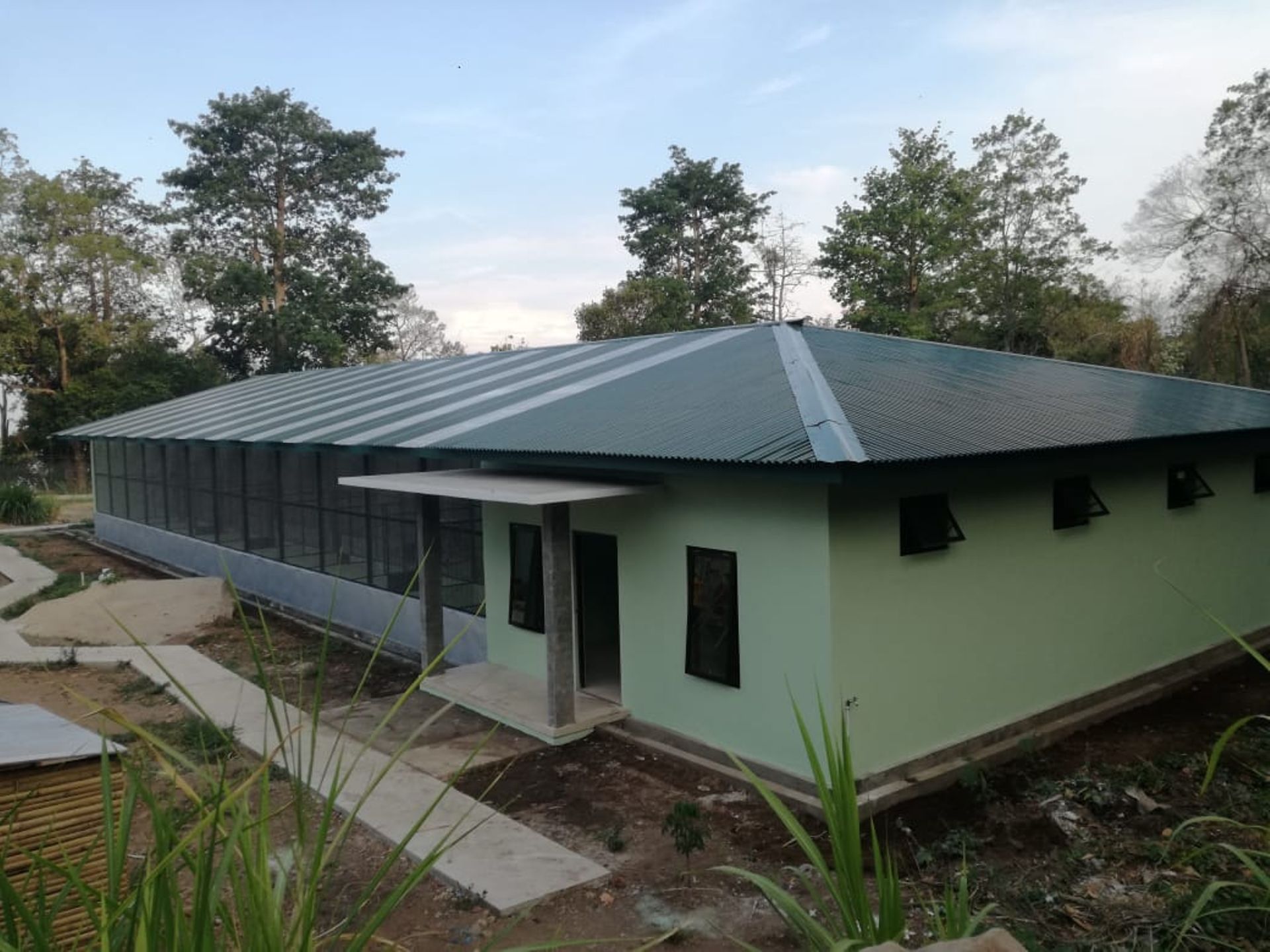

The pig facility is also taking shape, and we already welcomed 4 Javan warty pigs in August. The second part of the facility is still under construction and will accommodate several more pigs, so we will be able to keep a total of up to 20 animals.

And there they are! Still a bit shy, but they have already settled in. And from a distance. The outdoor enclosures offer plenty of space but still need to be planted with more pig-proof plants.
And from a distance. The outdoor enclosures offer plenty of space but still need to be planted with more pig-proof plants. Roy distributing food in the intermediate enclosure. They are given Indonesian potatoes, lettuce, papaya and banana, rice, corn, eggs, occasional fish or mice, and other treats.
Roy distributing food in the intermediate enclosure. They are given Indonesian potatoes, lettuce, papaya and banana, rice, corn, eggs, occasional fish or mice, and other treats.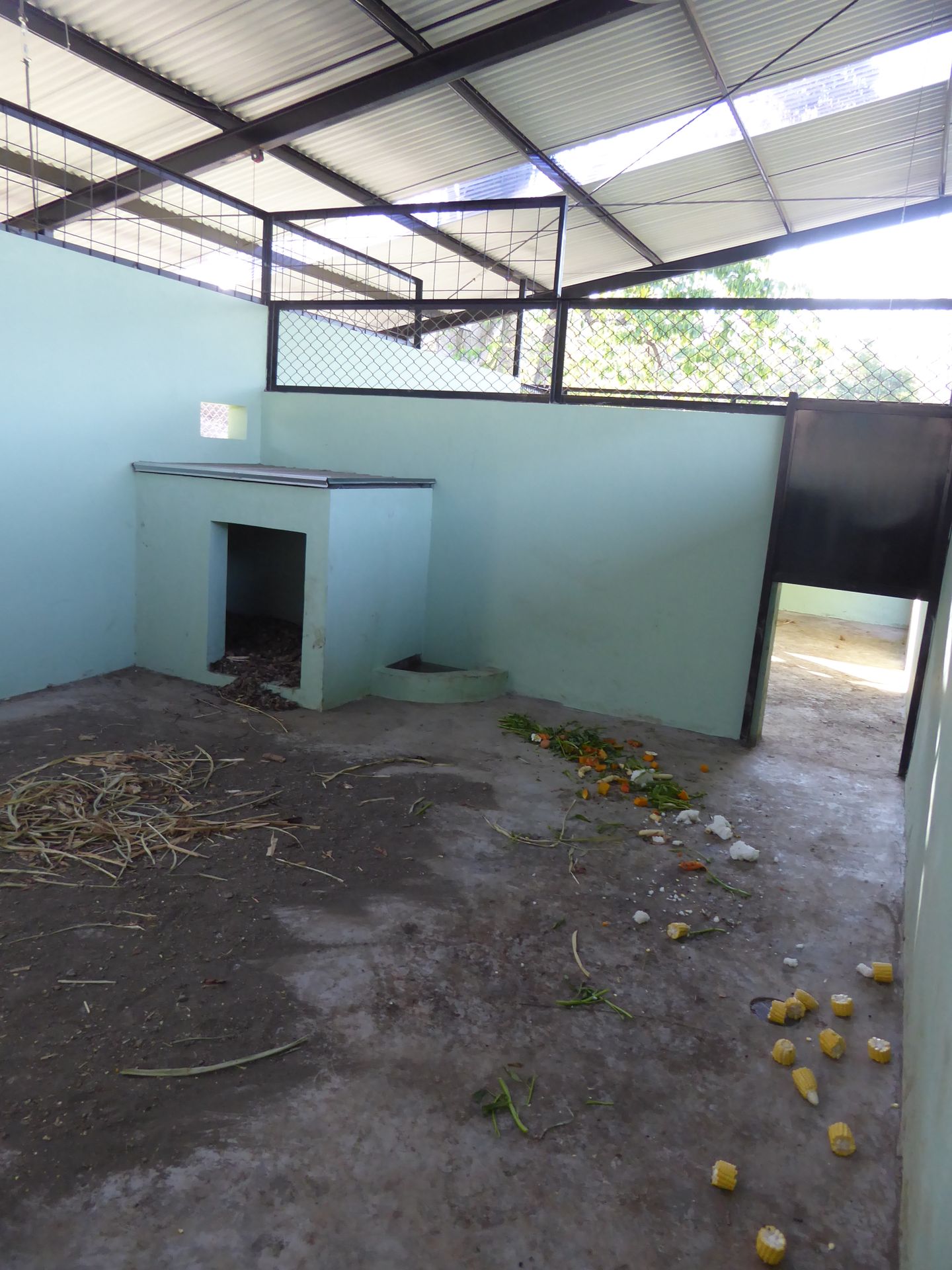 One of the indoor boxes with well-arranged food.
One of the indoor boxes with well-arranged food. What does an Indonesian do when he has to build a stable but there's a faucet in the way? Just build around it! Maybe the pigs need their own water supply in the sleeping box, who knows...
What does an Indonesian do when he has to build a stable but there's a faucet in the way? Just build around it! Maybe the pigs need their own water supply in the sleeping box, who knows...
A lot has also happened in terms of breeding! Some of our birds have been busy nesting, so we were able to enjoy several baby birds from the white-crowned shamas, but also a Javan whistling thrush and a Javan pied starling. Progress is being made! One of the white-crowned shama chicks shortly after fledging at about 2 weeks old.
One of the white-crowned shama chicks shortly after fledging at about 2 weeks old.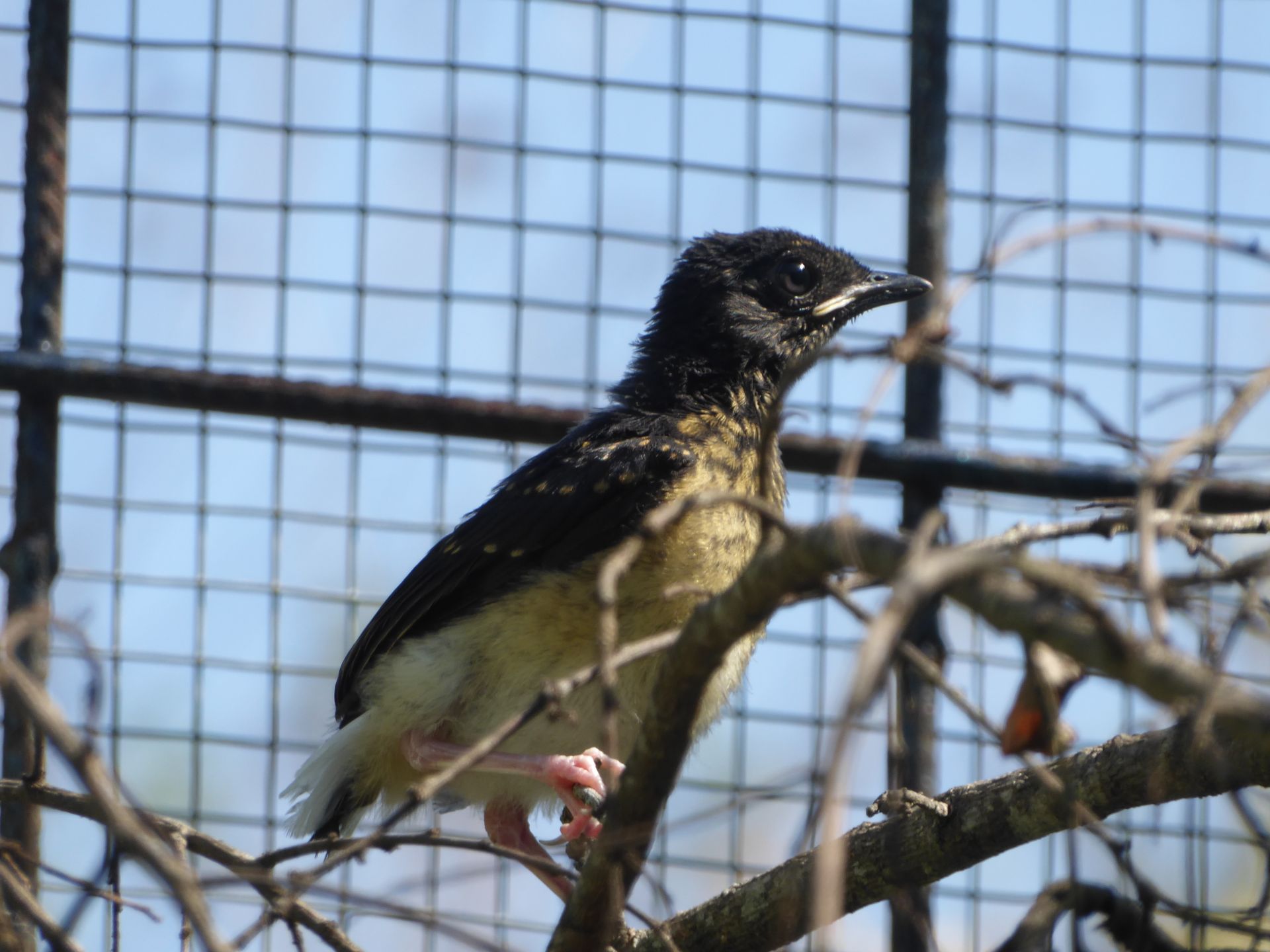 And here they are a bit older.
And here they are a bit older. And this is our biggest success so far: a Javan pied starling chick.
And this is our biggest success so far: a Javan pied starling chick. 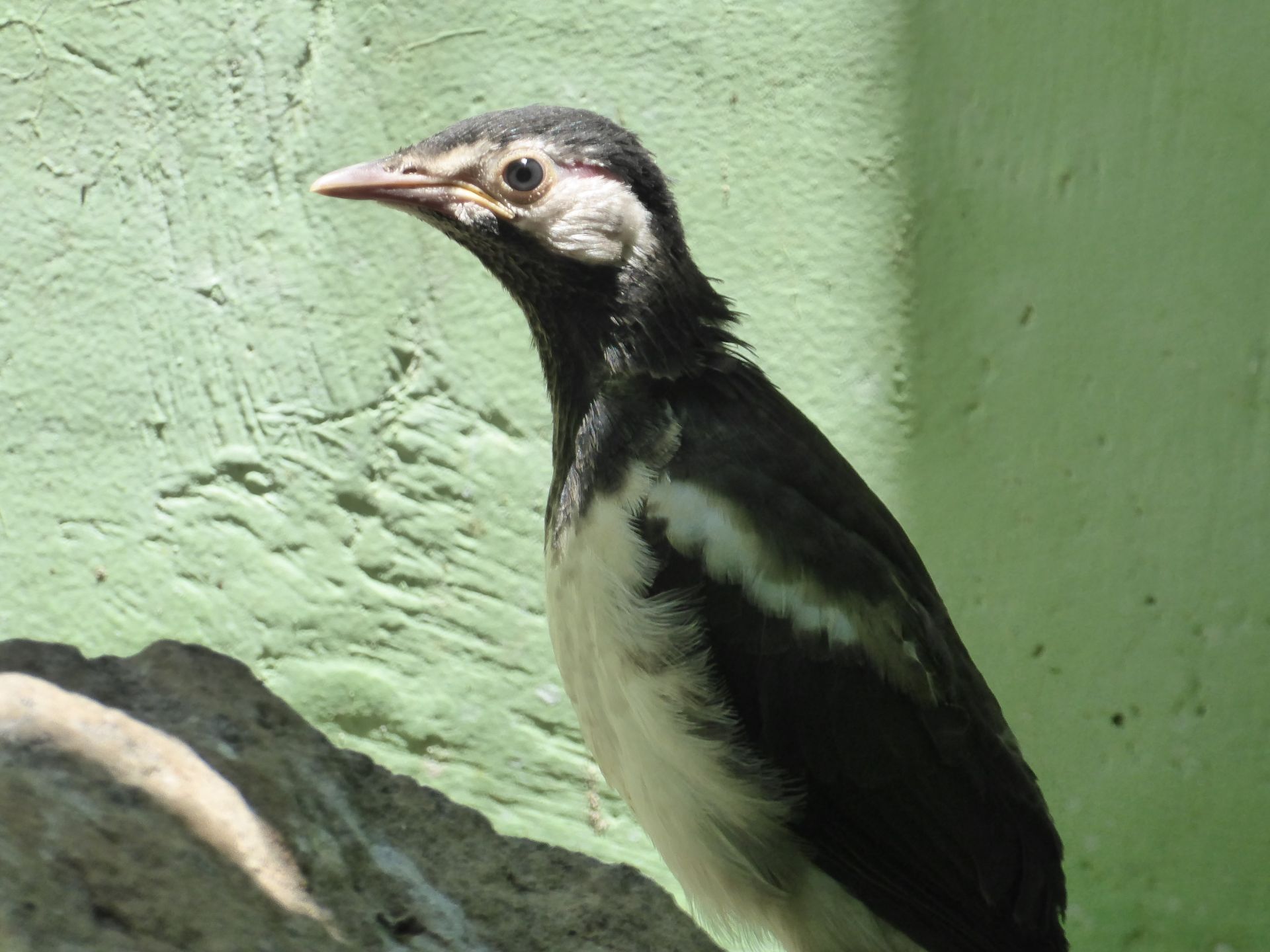 My personal highlight is our first breeding success with the Javan whistling thrush. It has grown a bit since this picture was taken and now lives with 2 white-crowned shama chicks in a shared enclosure.
My personal highlight is our first breeding success with the Javan whistling thrush. It has grown a bit since this picture was taken and now lives with 2 white-crowned shama chicks in a shared enclosure.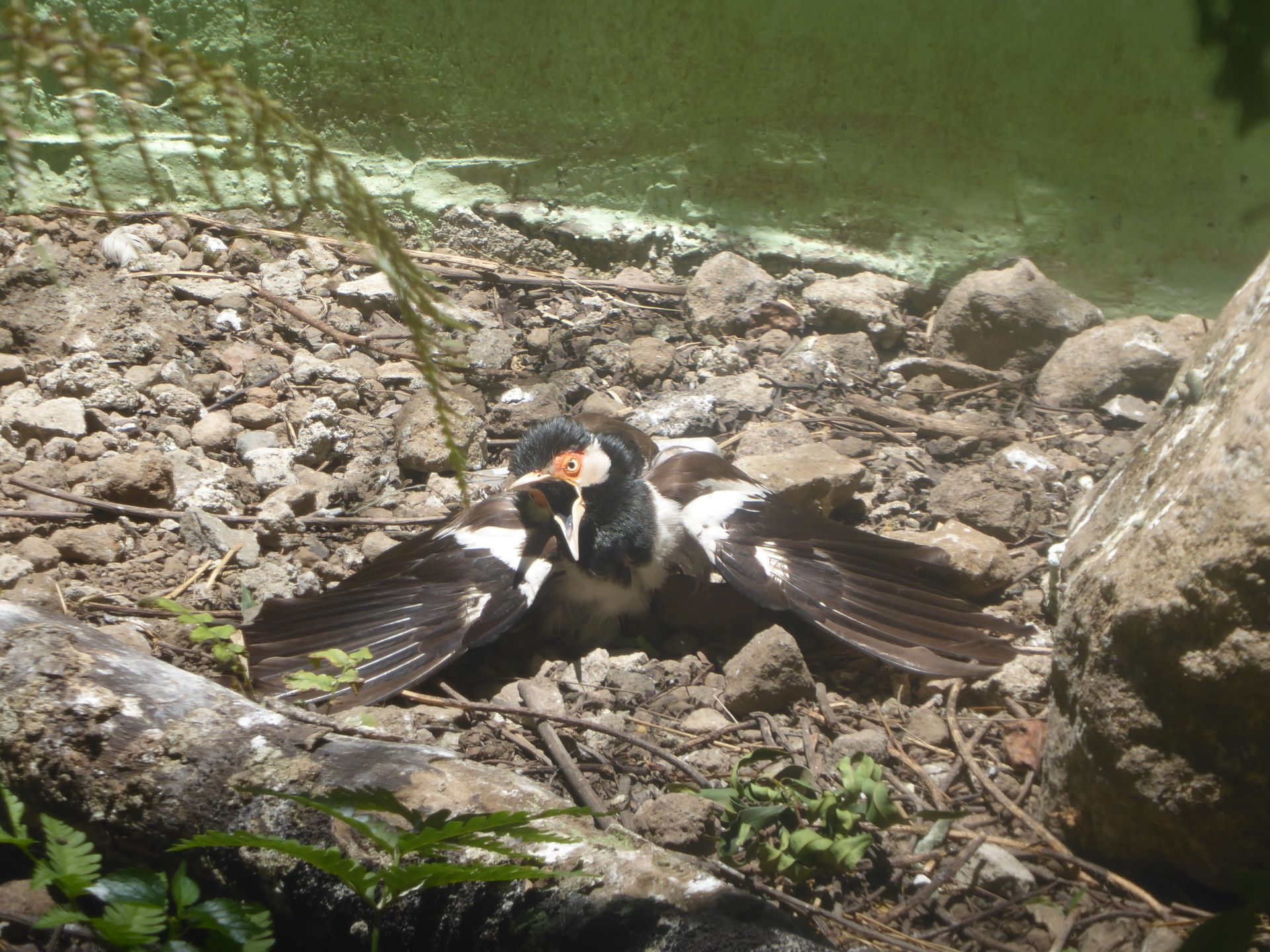 And this is its mother. Don't worry, she's doing fine, she's just sunbathing here.
And this is its mother. Don't worry, she's doing fine, she's just sunbathing here.
Since the whistling thrushes also feed on smaller vertebrates, we wanted to establish a rat breeding program in addition to our mouse breeding. However, we have only been able to acquire one female rat so far, so she is currently living alone. And because rats are really cool animals, she now enjoys a special status with Roy and me.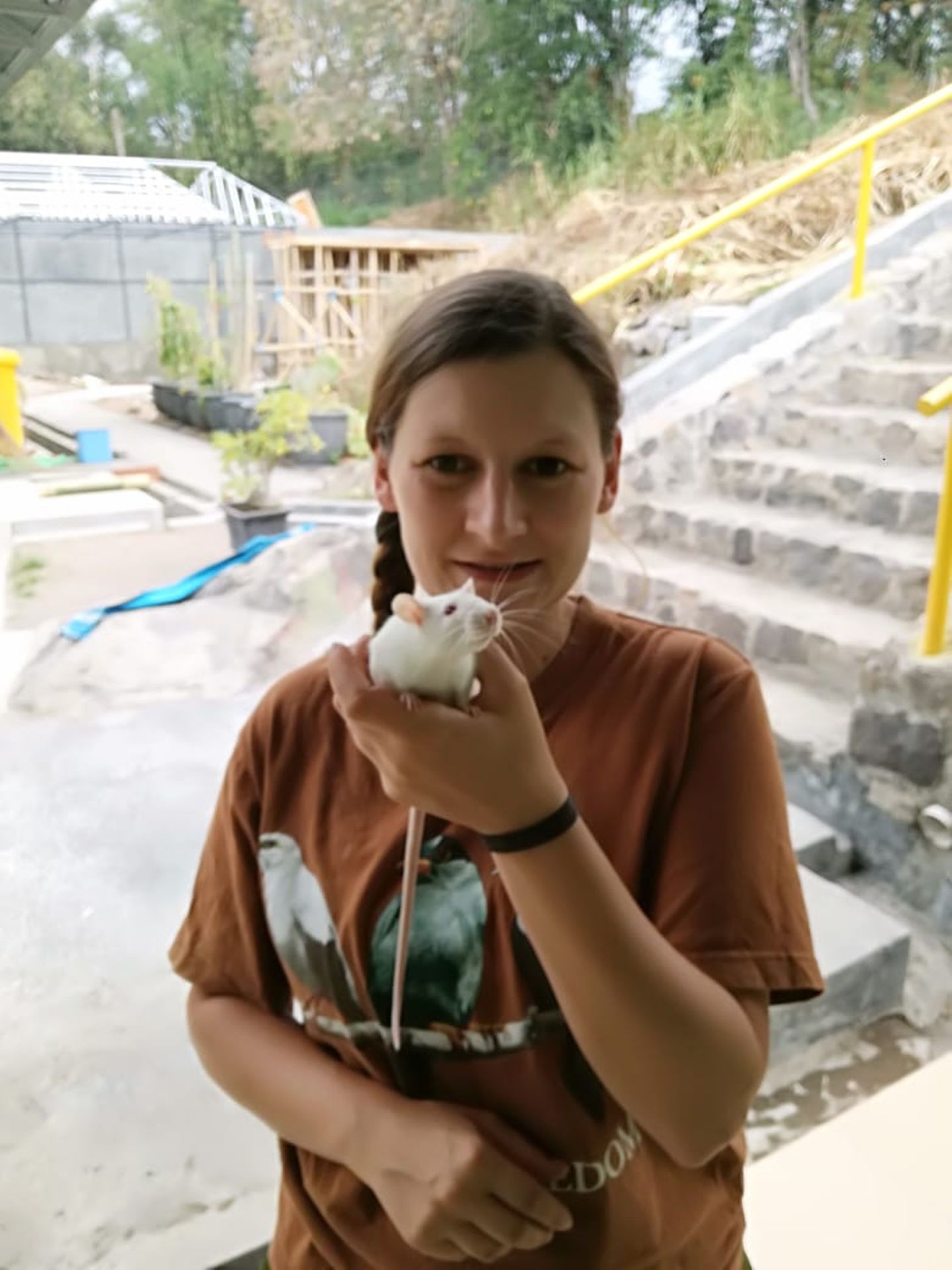 I named her 'Clara'.
I named her 'Clara'.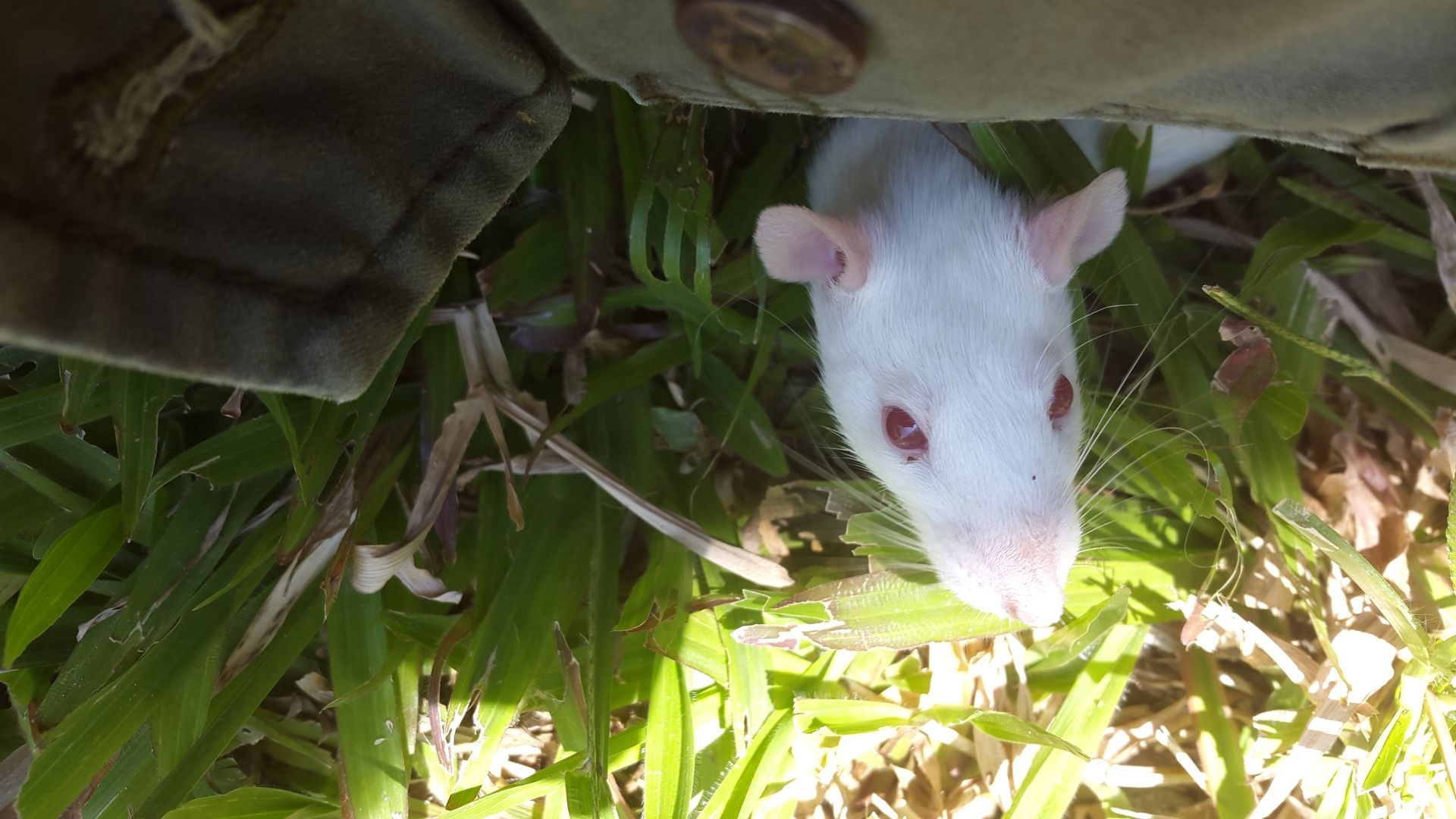 And when we have a little time in the afternoon, Clara is allowed to explore her surroundings...
And when we have a little time in the afternoon, Clara is allowed to explore her surroundings... ...or help Roy with mopping.
...or help Roy with mopping.
Lastly, a colorful mix of things that I still wanted to show: Part of my tomato harvest. I haven't had to buy tomatoes for several months now. I think of you when I eat them, Wenke ;)
Part of my tomato harvest. I haven't had to buy tomatoes for several months now. I think of you when I eat them, Wenke ;)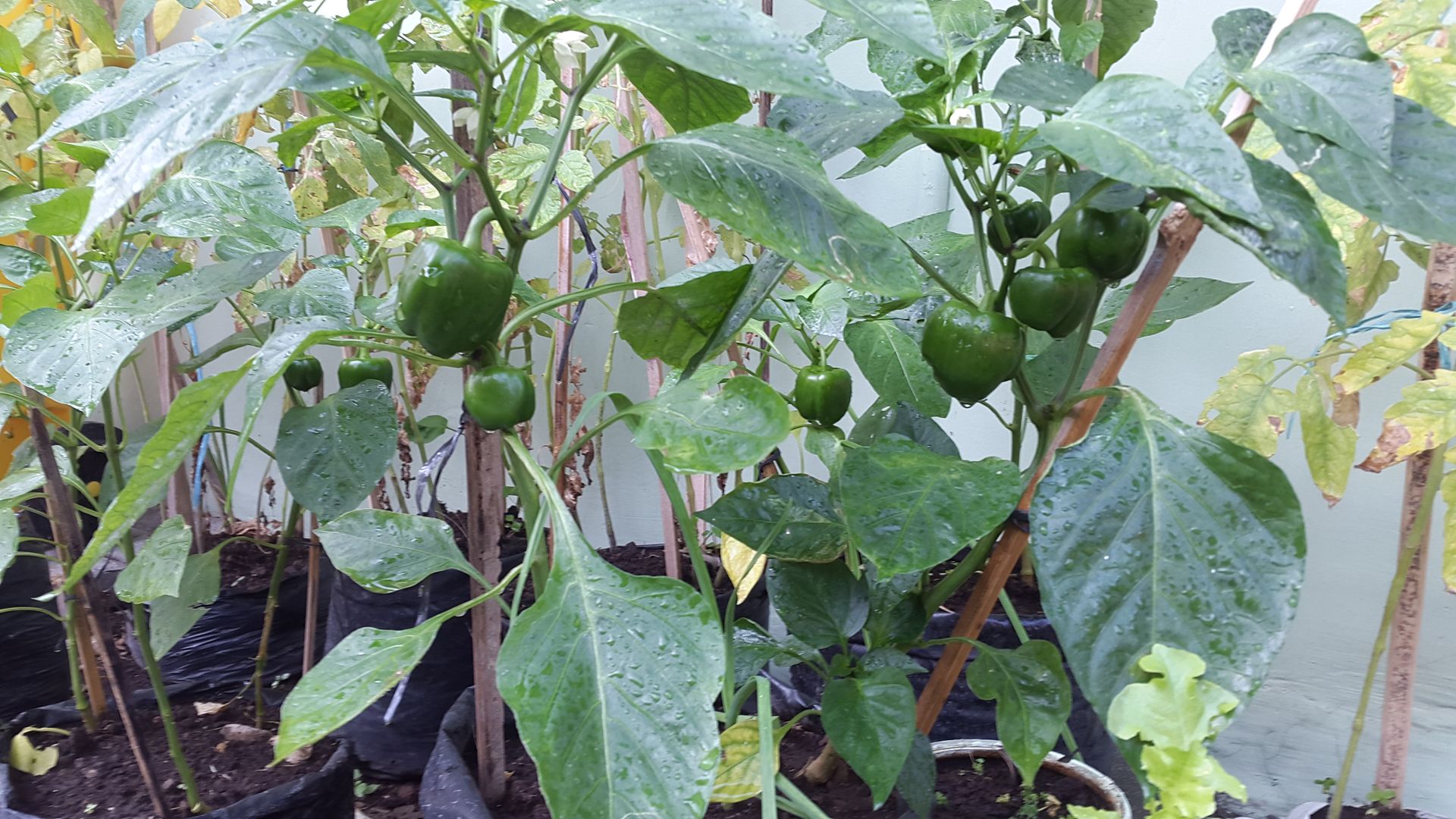 The bell peppers are also looking quite good, but unfortunately, they don't grow very big. However, they are sufficient for a little enjoyment.
The bell peppers are also looking quite good, but unfortunately, they don't grow very big. However, they are sufficient for a little enjoyment.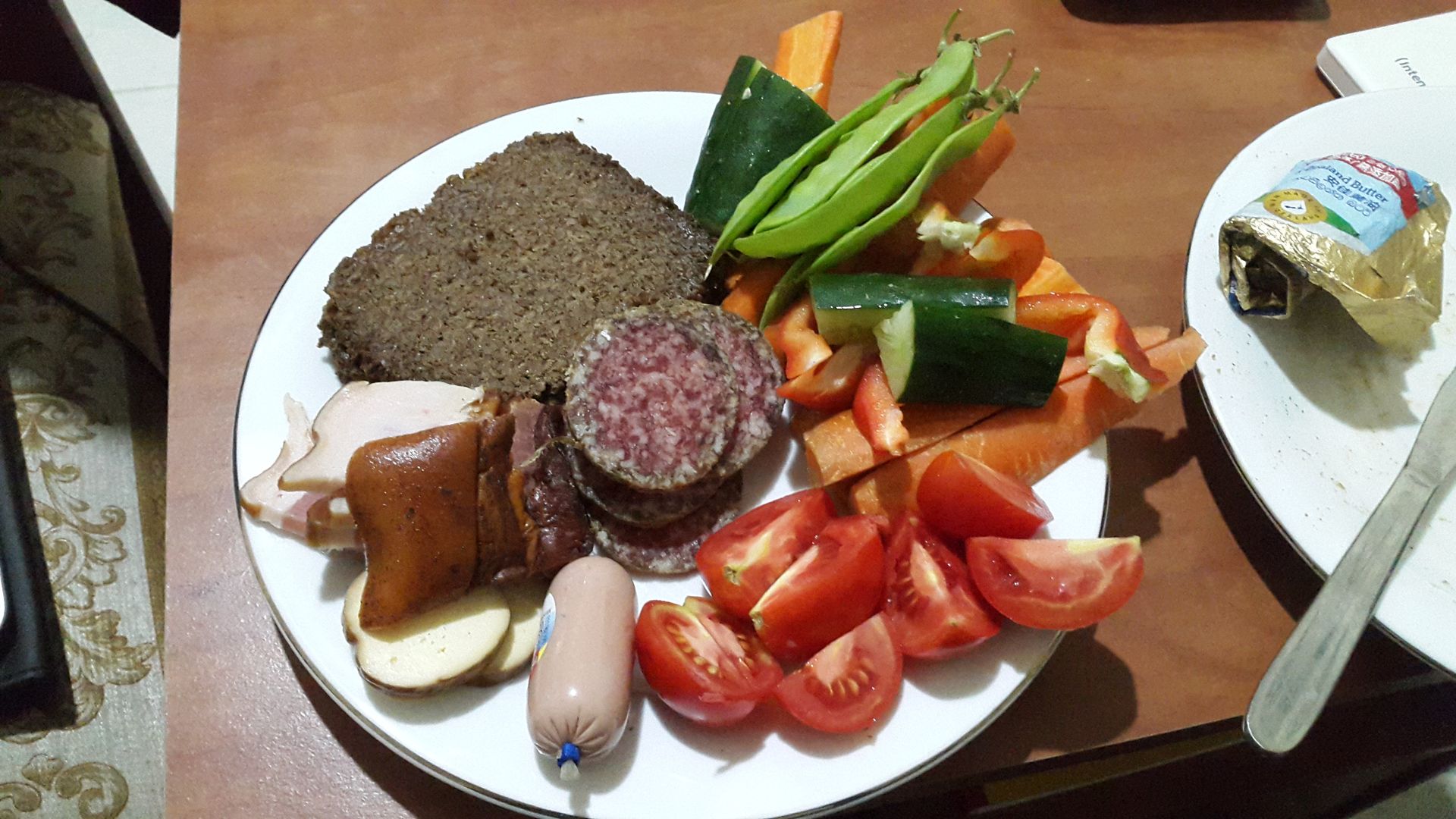 Over the past few months, we have received several packages. With the purchased vegetables from Malang, our own tomatoes, and the goodies from the packages, we have been able to create some delicious dinners. Thanks again to Papa, Mama, Silke, and Annelie! :D
Over the past few months, we have received several packages. With the purchased vegetables from Malang, our own tomatoes, and the goodies from the packages, we have been able to create some delicious dinners. Thanks again to Papa, Mama, Silke, and Annelie! :D
 The typical 'Heinz situation'. One person works, many stand around. Or pose or hold the bar or... although the security guard on the left is important for all our safety.
The typical 'Heinz situation'. One person works, many stand around. Or pose or hold the bar or... although the security guard on the left is important for all our safety. This is also typical Indonesian: When something is with cheese or tastes like cheese, it's always some kind of sweet treat like cookies or brownies. Yuck!
This is also typical Indonesian: When something is with cheese or tastes like cheese, it's always some kind of sweet treat like cookies or brownies. Yuck!

This is what it looks like at night at our place now. Since we wanted it to be a bit cozier, we bought a couch a while ago (it was the most beautiful one we could find, really!). Niko and Cumi love it here.

The typical 'Heinz situation'. One person works, many stand around.

This is also typical Indonesian: When something is with cheese or tastes like cheese, it's always some kind of sweet treat like cookies or brownies. Yuck!


 This is also typical Indonesian: When something is with cheese or tastes like cheese, it's always some kind of sweet treat like cookies or brownies. Yuck!
This is also typical Indonesian: When something is with cheese or tastes like cheese, it's always some kind of sweet treat like cookies or brownies. Yuck!That's it for now. I hope you liked my article, and I look forward to you continuing to follow our lives here with interest.
Terima Kasih!
Bhalisela i-Newsletter
Phendula (2)
Uwe
Super ich freue mich schon auf Februar um euch und eure Tiere zu BesuchenWenke
Hihi, ich freue mich, dass du an mich denkst :-D die letzten Tomaten für dieses Jahr sind geerntet und sie reifen nun hoffentlich noch nach. Und meine Paprikas sind auch nicht wirklich groß geworden. Es ist total schön wieder von euch zu lesen und wie immer mega spannend! Ich freue mich total, euch im Dezember zu treffen! 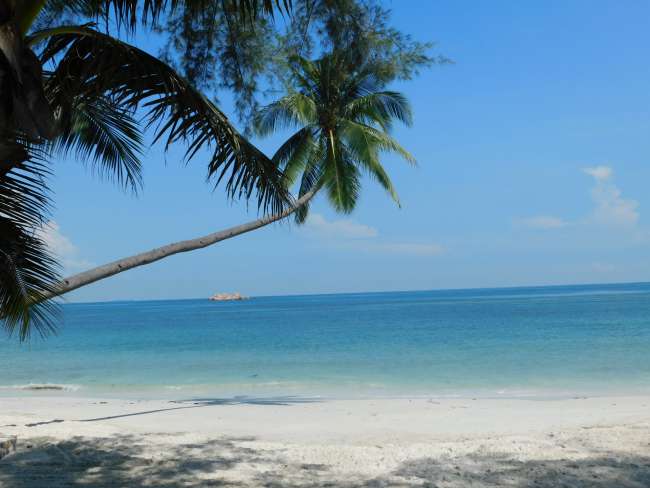
Imibiko yokuvakasha I-Indonesia
